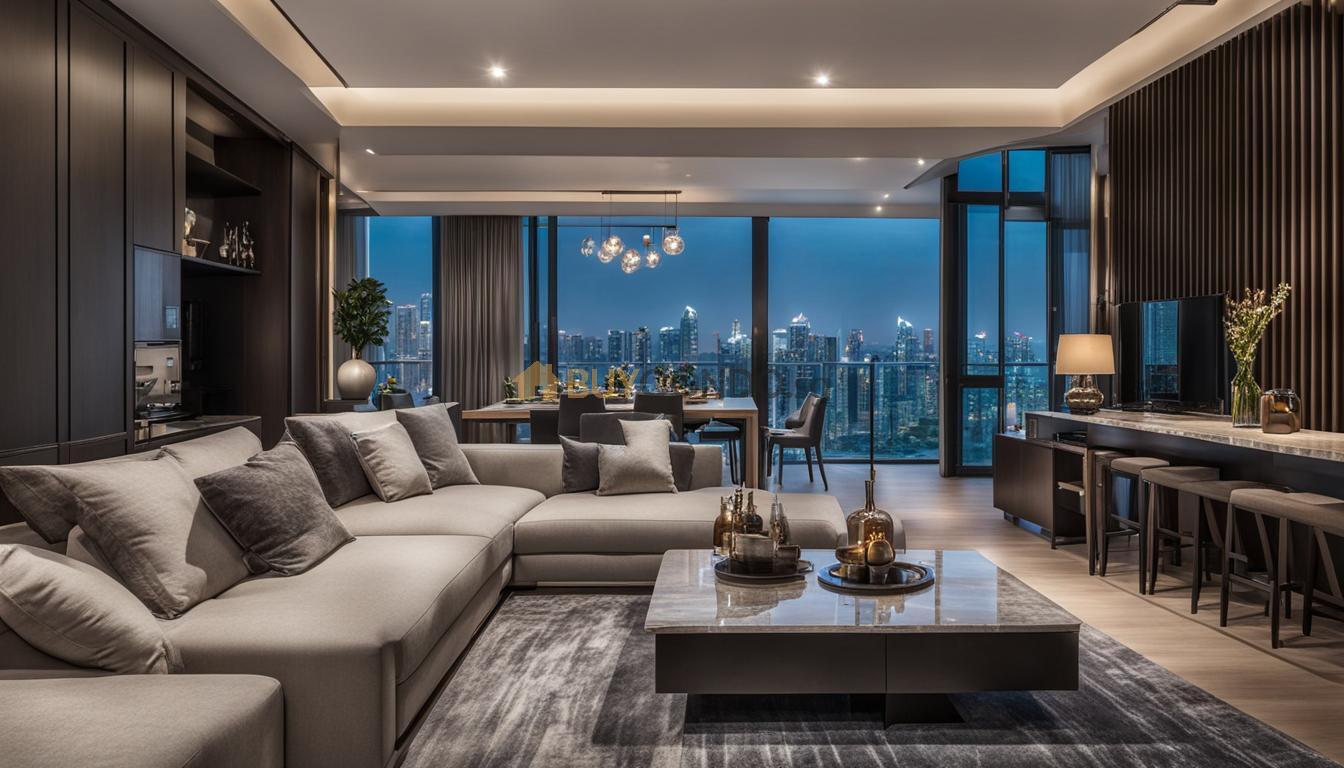The post Newly MOP HDB vs Older Resale HDB appeared first on Wing Tai Holdings Singapore.
]]>Hey there, homebuyers! Are you ready to dive into the exciting world of HDB flats in Singapore? Well, get ready for a dilemma! When it comes to purchasing a home, Singaporeans face a tough choice between newly MOP HDB flats and older resale HDB flats. It’s a decision that can make your head spin faster than a ferris wheel in Marina Bay Sands.
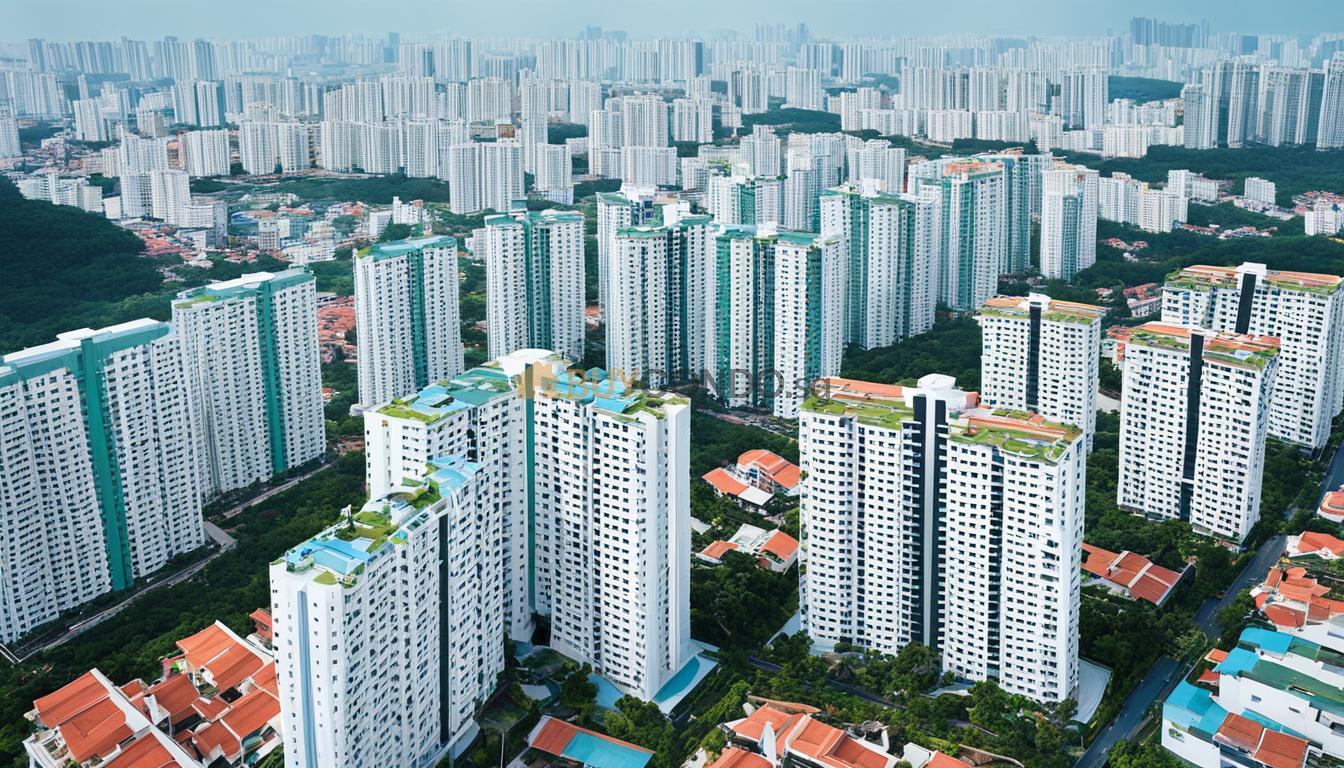
But fear not, my fellow homebuyers, for I am here to shed some light on this perplexing predicament. In this article, we’ll explore the factors that you need to consider in order to make an informed decision. From the core differences between newly MOP HDB flats and older resale HDB flats to the impact of the Minimum Occupation Period (MOP) on property value, we’ve got you covered.
So strap in, grab your kopi from the nearest kopi tiam, and let’s embark on this HDB adventure together!
Key Takeaways:
- Choosing between newly MOP HDB flats and older resale HDB flats can be a daunting task for homebuyers in Singapore.
- Factors such as property age, lease considerations, and pricing differentiate these two options.
- The Minimum Occupation Period (MOP) plays a significant role in the value and eligibility of HDB flats.
- Consider your life stage, room requirements, and investment potential when making your decision.
- Don’t forget to factor in amenities, location, and long-term returns to ensure a well-rounded evaluation.
Introduction: The Quest for Affordable Homeownership in Singapore
Affordable homeownership is no small feat in Singapore, where the high cost of real estate has left many aspiring homeowners grappling with the challenge of finding a place to call their own. As a homebuyer in Singapore, the dream of owning a property that meets both your budget and your needs requires careful consideration and a thorough understanding of the housing market. In this article, we will explore the various factors that contribute to the affordability of homeownership in Singapore, helping you navigate the complexities of the real estate landscape.
One of the key drivers behind the quest for affordable homeownership is the significant financial burden that comes with purchasing a property. The demand for housing in Singapore, coupled with limited land availability, has driven property prices to unprecedented heights. As a result, many homebuyers find themselves in a constant struggle to secure a home that fits their budget without compromising on quality and location.
“Affordable homeownership is not just about finding a property at a lower price. It’s about finding a balance between price, location, and the long-term financial implications of owning a home,” says John Tan, a real estate expert in Singapore.
In addition to the financial aspects, the scarcity of available housing options also contributes to the challenge of affordable homeownership. Singapore’s housing market is primarily dominated by public housing, known as HDB (Housing and Development Board) flats, which are typically more affordable compared to private properties. However, factors such as location, size, and leasehold status further influence their price and availability.
Despite these challenges, the Singaporean government has implemented various measures to support and promote affordable homeownership. These include grants, subsidies, and loan schemes aimed at helping first-time homebuyers overcome financial barriers. Additionally, the government has introduced policies to ensure a balanced and sustainable housing market, such as the Minimum Occupation Period (MOP) requirement for HDB flats.
Throughout this article, we will explore the factors that influence affordable homeownership in Singapore, providing insights and practical advice to help you make informed decisions in your quest for the perfect home. From understanding the core differences between newly MOP HDB flats and older resale HDB flats, to evaluating lease considerations and exploring property value trends across different regions, we will guide you through the complexities of the Singapore property market. So, let’s dive in and discover the path to affordable homeownership in Singapore!
Newly MOP HDB vs. Older Resale HDB: The Core Differences
When it comes to purchasing a home in Singapore, there is a crucial decision that homebuyers have to make: choosing between newly Minimum Occupation Period (MOP) HDB flats and older resale HDB flats. Understanding the core differences between these two options is essential in making an informed choice.
To begin with, one of the key distinctions between newly MOP HDB flats and older resale HDB flats is their property age. Newly MOP HDB flats typically refer to those that have completed the MOP period and are ready for occupancy, while older resale HDB flats have been previously owned and can vary in terms of age and condition.
Another critical factor to consider is the lease. Newly MOP HDB flats generally come with a longer remaining lease, offering more years of ownership. On the other hand, older resale HDB flats may have a shorter remaining lease, which could impact their value and the ability to secure financing.
Pricing is also an important aspect to compare. Newly MOP HDB flats tend to have a higher price due to their newer condition and longer remaining lease. Older resale HDB flats, on the other hand, may come at a relatively lower price, taking into account factors such as property age and remaining lease.
Understanding these core differences between newly MOP HDB flats and older resale HDB flats is crucial for homebuyers to evaluate and prioritize their needs and preferences. Whether it’s prioritizing a longer remaining lease, a lower price, or a newer property, each option has its own advantages and considerations.
Ultimately, the choice between newly MOP HDB flats and older resale HDB flats will depend on individual circumstances, financial capabilities, and future plans. It is recommended to carefully evaluate these factors and seek professional advice before making a decision.
Visual representation of the core differences between newly MOP HDB and older resale HDB.
| Factors | Newly MOP HDB | Older Resale HDB |
|---|---|---|
| Property Age | Newer | Varies |
| Lease | Longer Remaining Lease | Shorter Remaining Lease |
| Pricing | Higher | Relatively Lower |
Understanding the Minimum Occupation Period (MOP) and Its Impact on Property Value
When considering the purchase of a newly MOP HDB flat or an older resale HDB flat, it is essential to understand the concept of the Minimum Occupation Period (MOP) and its influence on property value. The MOP is a crucial factor that directly affects the marketability and value of your home.
What is MOP and Why Does It Matter?
The Minimum Occupation Period (MOP) refers to the mandatory period during which HDB flat owners are required to live in their property before they are eligible to sell or rent it out. This policy aims to ensure stable communities and provide homeowners with the opportunity to establish roots in their neighborhood. The MOP duration typically ranges from 5 years.
“The MOP is like a commitment period, where homeowners are encouraged to settle down and contribute to the community without the distractions of property speculation.”
During the MOP, homeowners are not allowed to sell, transfer ownership, or rent out their flat. Violating the MOP regulations can result in penalties or legal repercussions. Therefore, it is crucial to understand and comply with the MOP guidelines to avoid any complications in the future.
The Influence of MOP on Newly Acquired HDBs
For those looking to purchase a newly MOP HDB flat, it is important to consider the impact of the MOP on the property value. Newly MOP HDB flats are still within the MOP period, which means that their marketability is limited. Buyers who plan to sell the flat before the MOP ends may face challenges in finding potential buyers due to the restrictions imposed.
However, it’s worth noting that once the MOP period is over, the value and marketability of the HDB flat may increase significantly. The completion of the MOP allows homeowners to explore various options, such as selling or renting out the property, thereby increasing its potential value. Additionally, being in a mature estate or a desirable location can further enhance the overall value of the HDB flat once the MOP is fulfilled.
| MOP Status | Implications on Property Value |
|---|---|
| Before MOP | Limited marketability and restricted selling options |
| After MOP | Potential increase in value and marketability, more selling and renting options available |
As with any property investment, it is important to consider your long-term goals and financial capability when deciding between newly MOP HDB flats and older resale HDB flats. Understanding the MOP and its implications on property value can help you make a more informed decision.
https://buycondo.sg/hdb-vs-private-condominium-which-is-more-significant/
Evaluating Property Lifespan: Lease Considerations for HDB Flats
When considering purchasing an HDB flat, it is essential for homebuyers to evaluate the lifespan of the property and take into account the lease considerations. The property lifespan and lease remaining on HDB flats can significantly impact the value and longevity of the property, making it a crucial factor in the decision-making process.
One of the key aspects to consider is the remaining lease on the HDB flat. HDB flats have a lease of 99 years, and it is important to assess how many years are left on the lease before making a purchase. The lease remaining affects both the potential resale value of the property and the buyer’s ability to enjoy the property over the long term.
With a shorter lease remaining, the property may become less desirable in the resale market as its value decreases over time. Additionally, as the lease gets closer to expiry, the HDB flat may become less attractive to potential buyers, making it harder to sell in the future. Therefore, considering the lease remaining is crucial for buyers who are looking for a property with long-term investment potential.
However, it’s important to note that the remaining lease does not solely determine the value of an HDB flat. Other factors such as location, amenities, and the overall condition of the flat also play a significant role. Buyers should evaluate the lease considerations in conjunction with these factors to make a well-rounded assessment of the property’s value and potential.
Moreover, for buyers who plan to live in the HDB flat for the entire lease duration, the remaining lease may be less of a concern. In such cases, the focus may be more on the suitability of the flat for the buyer’s current and future needs, rather than its potential resale value.
“The lease considerations for HDB flats require careful evaluation. It’s not just about the number of years remaining, but also the overall condition, location, and amenities of the property. It’s important to find the right balance that aligns with your long-term goals and preferences.”
| Lease Considerations | Impact |
|---|---|
| Shorter remaining lease | – Decreased resale value – Potential difficulty in finding buyers – Limited long-term investment potential |
| Longer remaining lease | – Higher resale value – Increased attractiveness to potential buyers – Extended long-term investment potential |
| Living in the property for entire lease duration | – Focus on suitability for current and future needs – Resale value may be of less priority |
Assessing the property lifespan and taking lease considerations into account is a critical step in making an informed decision when buying an HDB flat. By carefully evaluating the remaining lease and considering other factors that influence the value of the property, homebuyers can ensure that their investment aligns with their long-term goals and preferences.
Life Stages and Housing Choices: From Singles to Young Families
Different life stages present unique housing challenges and considerations. As individuals transition through various stages of life, their housing needs and preferences naturally evolve. From singles seeking youthful independence to young families in need of space and stability, each life stage brings its own set of housing choices.
When Youthful Independence Clashes with Housing Rules
Singles often value their independence and desire a housing arrangement that aligns with their lifestyle. However, in Singapore, housing rules can pose challenges for single individuals. The Housing and Development Board (HDB) sets specific eligibility criteria for purchasing certain types of housing, such as public housing flats. Singles may face restrictions or limitations when it comes to buying a home that suits their preferences.
However, there are alternative housing choices available for singles in Singapore. Private rental options, such as condominiums or apartments, provide greater flexibility and fewer restrictions compared to HDB flats. These options allow singles to enjoy the freedom and independence they desire without being confined by the housing rules that apply to public housing. Additionally, co-living arrangements are gaining popularity among singles, offering a cost-effective and communal living experience.
Advantages for Married Couples in the HDB Market
Married couples, on the other hand, often enjoy certain advantages in the HDB market. The HDB offers various housing schemes and grants specifically designed for married couples, making it easier for them to own a home. These schemes include the Married Child Priority Scheme, the Parenthood Priority Scheme, and the Proximity Housing Grant, among others.
Married couples can also benefit from the stability and affordability of HDB flats. HDB estates typically provide a range of amenities, such as schools, parks, and community centers, which are ideal for families with young children. The strong sense of community within HDB estates can also contribute to a fulfilling family-oriented lifestyle.
Ultimately, the housing choices available to singles and young families depend on individual circumstances, preferences, and financial capabilities. Considering the clash between youthful independence and housing rules for singles, as well as the advantages offered to married couples in the HDB market, can help individuals make informed decisions about their housing options.
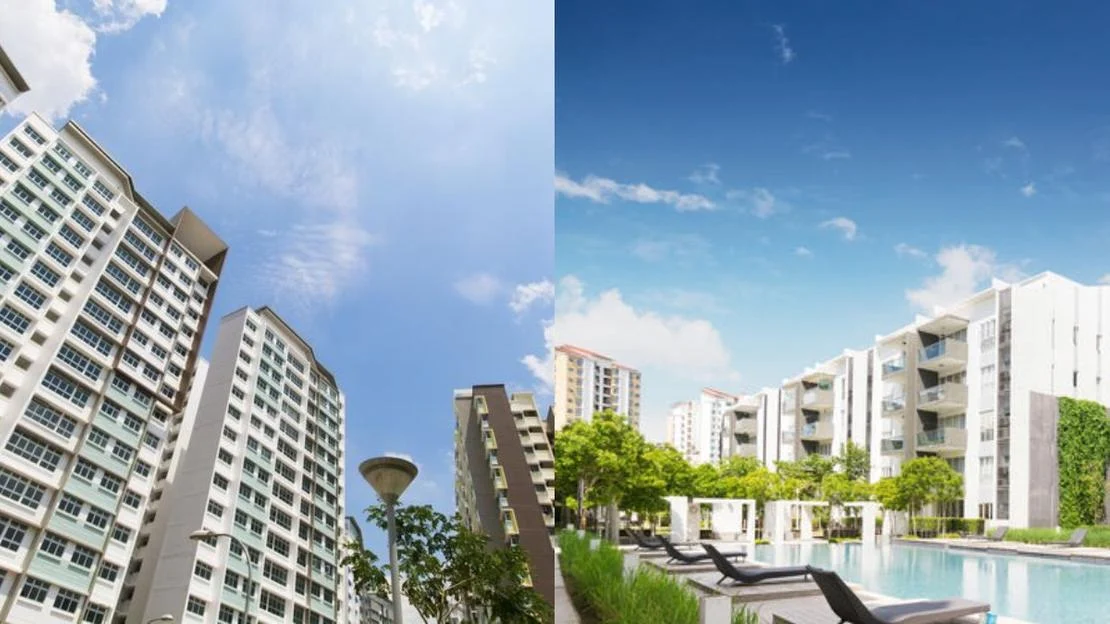
Envisioning Your Long-Term Residence: Newly MOP-ed HDB vs. Aging Resale Options
Projection of Home Value Over Time
When choosing between newly MOP-ed HDB flats and aging resale options, it’s essential to consider the projection of home value over time. Investing in a property is a long-term decision, and understanding how it may appreciate or depreciate in value can have a significant impact on your financial future.
Considering Comfort and Community Ties in Your Decision
It’s not just about the monetary aspect when deciding between newly MOP-ed HDB flats and aging resale options. The comfort and sense of belonging that come with living in a community should also play a crucial role in your decision-making process.
When you envision your long-term residence, think about the amenities, facilities, and neighborhood characteristics that matter most to you. Are you looking for a vibrant, bustling neighborhood with a diverse range of shops and restaurants? Or do you prefer a quieter, close-knit community with plenty of green spaces for relaxation?
Consider the proximity to essential amenities such as schools, healthcare facilities, and transportation options. Furthermore, think about the availability of recreational centers, parks, and community spaces that foster social interaction and the building of lasting relationships with your neighbors.
Your long-term residence isn’t just a physical structure; it’s where you’ll create memories, forge friendships, and establish community ties. Don’t underestimate the importance of finding a place that aligns with your lifestyle and offers the support and camaraderie that contribute to a fulfilling living experience.
With the projection of home value over time and the consideration of comfort and community ties, you’ll be better equipped to make an informed decision about your long-term residence. So take the time to analyze the factors that matter most to you and choose the option that aligns with your goals and aspirations.
Size Matters: Room Requirements for Different Buyer Profiles
When it comes to purchasing a home, the size of the rooms can make a big difference. Homebuyers have different room requirements based on their profiles, and it’s important to consider these needs before making a decision.
For families with children, spacious bedrooms are a top priority. Kids need space to play, study, and grow. Having enough room for a bed, a desk, and storage is essential for their comfort and development.
On the other hand, young professionals or couples without children may prioritize a home office or a spare room for hobbies. Whether it’s for remote work, creative pursuits, or a small home gym, having an extra space can enhance the overall livability of the home.
For elderly individuals or those with mobility challenges, a well-designed bedroom and bathroom that are easily accessible and can accommodate assistive devices can greatly improve comfort and quality of life.
Decoding the Singapore Property Market: Ideal Regions for HDB Flats
When it comes to investing in HDB flats, understanding the Singapore property market is crucial. Different regions offer unique advantages and property value trends that can greatly impact your investment decision. In this section, I will help you decode the Singapore property market and identify the ideal regions for HDB flats.
Property Value Trends Across Different Regions
The property value trends across different regions in Singapore can vary significantly. Factors such as location, amenities, and accessibility can greatly influence the value of HDB flats. It’s important to consider both current market conditions and potential future developments when assessing property value trends.
To illustrate the varying property value trends, let’s take a look at the following table:
| Region | Average HDB Flat Price | Property Value Trend |
|---|---|---|
| Central Region | $800,000 | Stable |
| North Region | $450,000 | Stable |
| East Region | $550,000 | Slightly increasing |
| West Region | $450,000 | Moderately increasing |
As you can see, the Central Region has experienced rapid property value growth, making it an ideal region for HDB flat investments. The North and East Regions offer stability and moderate growth, while the West Region provides more affordable options with moderate value increases. Understanding these trends can help you make an informed decision based on your budget and investment goals.
Finding the Sweet Spot: Location vs. Property Age
When choosing an ideal region for your HDB flat, it’s important to strike a balance between location and property age. While a prime location can offer convenience and potential for higher property value appreciation, the age of the property plays a significant role in maintenance costs and potential renovations.
Remember, it’s not just about the location – it’s about finding the sweet spot where location aligns with your property age preferences.
For example, if you prefer a vibrant city lifestyle, the Central Region might be your sweet spot, where newer developments offer modern amenities and easy access to downtown attractions. On the other hand, if you value a more tranquil environment and are willing to invest in renovations, an older HDB flat in the North Region might be suitable for you.
By carefully considering the location and property age, you can find the sweet spot that aligns with your lifestyle, budget, and long-term investment goals.
Considering Renovations: Additional Costs for Your Dream Home
When it comes to purchasing your dream home, renovations can be a crucial factor to consider. While you may have found the perfect HDB flat, it’s important to evaluate the additional costs and financial implications that come with upgrading and personalizing your space.
Determining Your Readiness for Property Makeovers
Before diving into renovations, it’s essential to assess your readiness for property makeovers. Consider the following factors:
- Time: Renovations require time and effort. Assess whether you have the bandwidth to manage the process or if you need to hire professionals.
- Budget: Establish a realistic budget for your renovation project. Evaluate your financial readiness and ensure you have sufficient funds to cover the additional costs.
- Personal Preferences: Understand your design preferences and the extent of changes you desire. Determine if you’re open to minor upgrades or if you’re looking for a complete overhaul.
- Practical Considerations: Evaluate the practicality of renovations, taking into account your lifestyle, family needs, and any future plans that may affect the longevity of the improvements.
By carefully considering these factors, you can determine if you’re truly ready to take on property makeovers and make an informed decision based on your individual circumstances.
The Financial Implications of Upgrading an HDB Flat
Upgrading an HDB flat involves financial implications that should not be overlooked. Apart from the cost of the renovations themselves, there are other considerations to keep in mind:
- Additional Costs: Renovations often come with unforeseen expenses such as permits, contractor fees, and potential delays. Factor in these additional costs to avoid any surprises.
- Value-Added: While renovations can enhance your living experience, it’s important to assess whether they will add value to your HDB flat. Consider the potential increase in property value and the overall market demand for upgraded units in your area.
- Selling or Renting: If you plan to sell or rent out your HDB flat in the future, evaluate the return on investment (ROI) of your renovations. Will the upgrades significantly impact the rental or resale value of your property?
Understanding the financial implications of upgrading an HDB flat will help you make smart decisions and ensure you stay within your budget while still achieving your dream home.
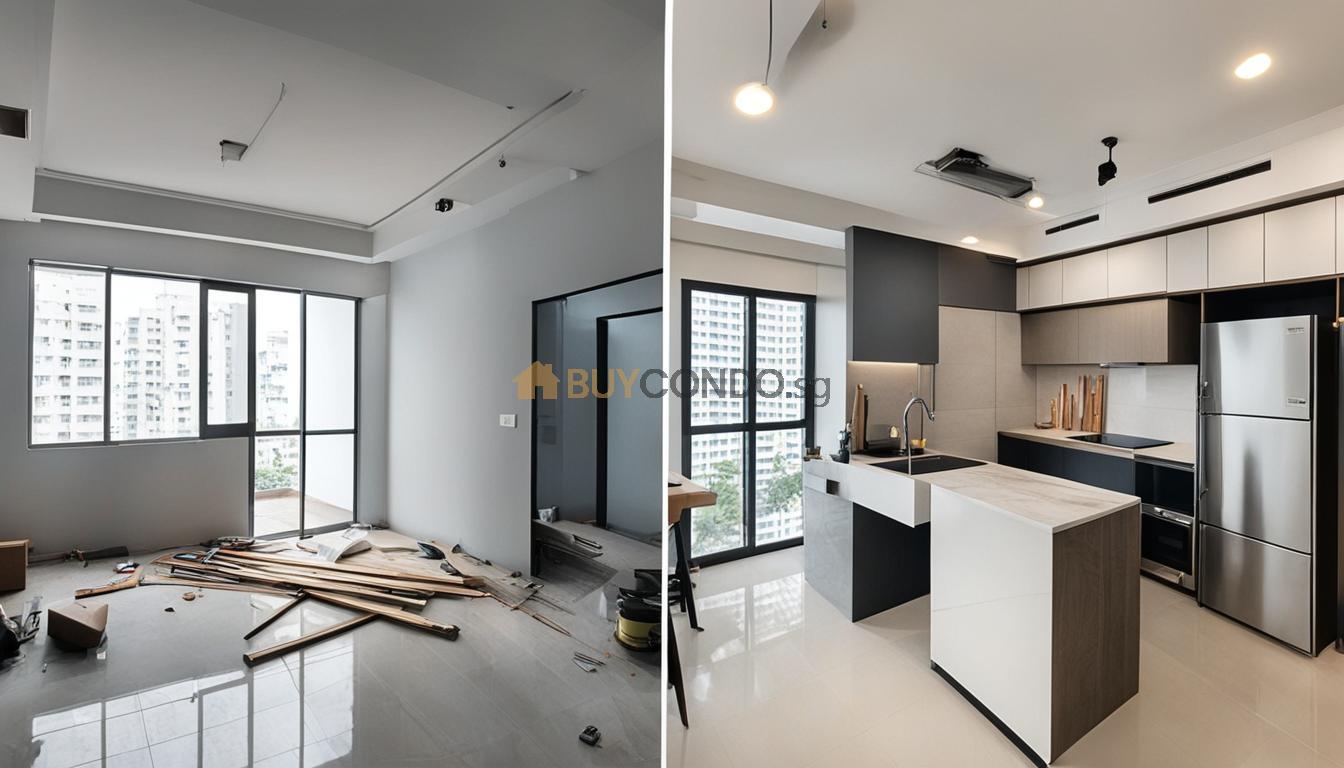
Amenity Considerations: What’s Important in Your HDB Living Experience?
When it comes to choosing the perfect HDB flat, amenity considerations can make all the difference in creating a comfortable and convenient living experience. As a savvy homebuyer, it’s important to evaluate the amenities available in the surrounding area and within the HDB estate itself to ensure you’re making the right decision.
One of the key amenity considerations is the proximity to essential facilities such as schools, healthcare centers, and shopping malls. Having these amenities nearby can greatly enhance your daily life, offering convenience and accessibility to everything you need.
Furthermore, recreational amenities play a significant role in improving your overall living experience. Look out for nearby parks, sports facilities, and community centers that offer opportunities for leisure activities, exercise, and socializing. These amenities not only promote a healthier lifestyle but also encourage a sense of community and connection.
In addition to external amenities, it’s important to consider the facilities within the HDB estate itself. Many newer HDB flats come equipped with a wide range of facilities such as playgrounds, fitness corners, and swimming pools. These on-site amenities provide convenience and entertainment right at your doorstep, ensuring that there’s always something to do within the estate.
When assessing amenity considerations, it’s essential to prioritize your personal preferences and lifestyle needs. Consider what amenities are most important to you and align them with your daily routine and long-term goals. By doing so, you’ll be able to make a well-informed decision that caters to your unique living experience.
Remember, an HDB flat is not just a physical dwelling, but a place where you’ll be building a life. So, take the time to carefully evaluate the amenity considerations and create a living experience that meets your expectations and enhances your quality of life.
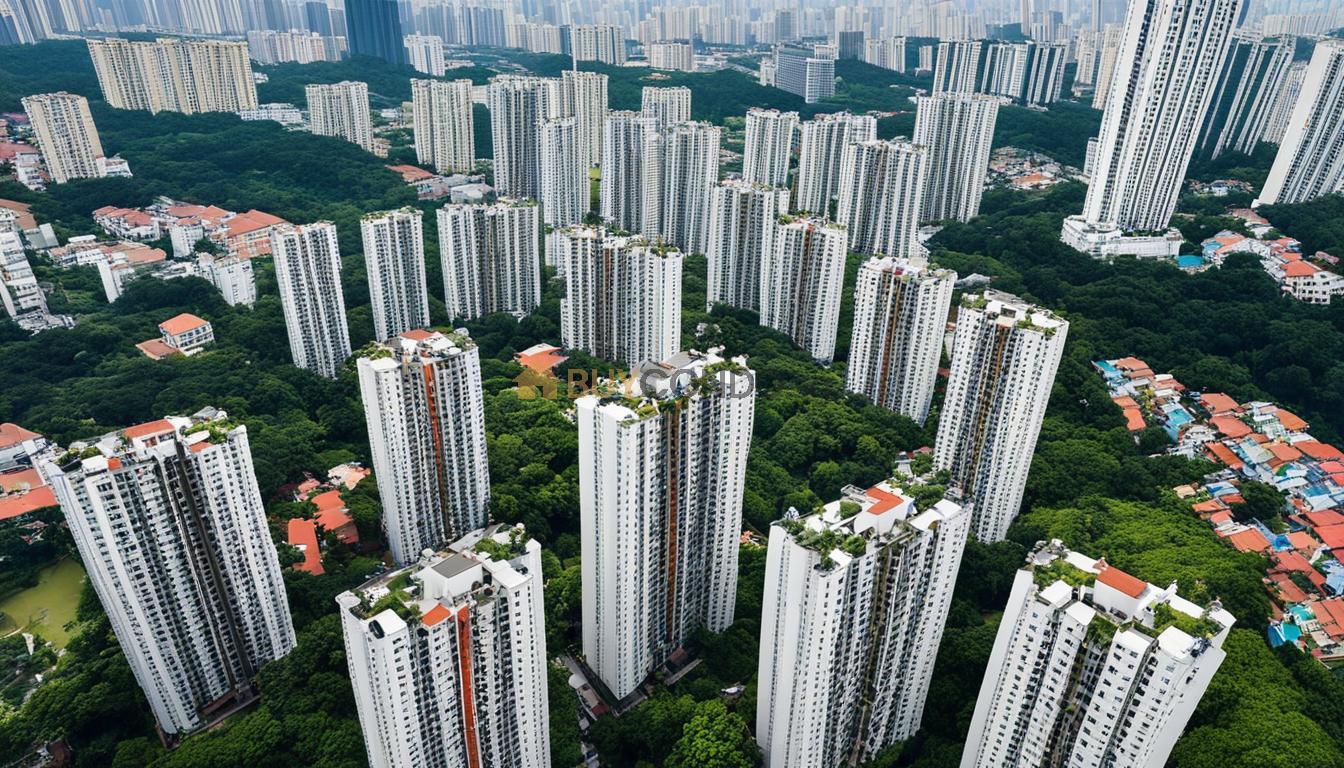
Assessing Investment Potential: Understanding Long-term Returns on HDB Properties
When it comes to purchasing a home, it’s not just about finding the perfect place to live. Homebuyers also need to consider the investment potential of their property. In the case of HDB properties, understanding the long-term returns is crucial to making a wise decision.
Investing in an HDB property offers unique opportunities for long-term growth and stability. With Singapore’s strong real estate market, HDB properties have the potential to appreciate in value over time, providing homeowners with significant returns on their investment.
One of the key factors that contribute to the investment potential of HDB properties is the location. HDB flats located in desirable neighborhoods with good amenities and accessibility tend to appreciate at a higher rate. These properties attract a larger pool of potential buyers, which can drive up their value over time.
Additionally, the supply and demand dynamics of the HDB market play a role in determining the long-term returns. HDB flats with limited supply and high demand are more likely to experience price appreciation. As the population in Singapore continues to grow, the demand for HDB properties is expected to remain strong.
It’s also important to consider the lease of the HDB property when assessing its investment potential. HDB flats have a leasehold tenure, and the length of the lease remaining can impact the value of the property. Homebuyers should take into account the remaining lease and consider how it aligns with their long-term investment goals.
In addition to potential capital appreciation, HDB properties can also provide a steady rental income. With the growing demand for rental properties in Singapore, homeowners have the opportunity to generate passive income by renting out their HDB flats. This can contribute to the overall long-term returns of the investment.
However, it’s important to note that while HDB properties have strong investment potential, they are subject to certain restrictions. For example, homeowners are not allowed to sublet their entire HDB flat if they have not met the Minimum Occupation Period (MOP). This limitation should be taken into account when evaluating the investment potential of an HDB property.
In conclusion, assessing the investment potential of HDB properties is essential for homebuyers looking to make a wise and profitable purchase. By considering factors such as location, supply and demand, lease considerations, and rental income, homebuyers can gain a better understanding of the long-term returns they can expect from their HDB investment.
Conclusion: Making an Informed Choice Between Newly MOP HDB and Older Resale HDB
Well, here we are at the end of our journey through the world of HDB flats in Singapore. It’s been quite a ride, hasn’t it? We’ve explored the core differences between newly MOP HDB flats and older resale options, learned about the Minimum Occupation Period (MOP), and dived into the importance of lease considerations. But now, it’s time to make that crucial decision: which path will you choose?
When it comes to buying a home, making an informed choice is key. It’s not just about the property itself but also about your personal circumstances and goals. Take some time to reflect on what truly matters to you. Consider your budget, your lifestyle, and your long-term plans. Think about the pros and cons of each option and how they align with your needs.
For some, the allure of a brand-new HDB flat, waiting eagerly after the Minimum Occupation Period (MOP), might be too hard to resist. The idea of a fresh start with modern amenities and facilities can be exciting. On the other hand, older resale options have their own charm – more spacious layouts, established communities, and the possibility of scoring a great location.
Ultimately, there is no right or wrong answer. It all boils down to what you value most. So, take your time, consult with your loved ones, and weigh the pros and cons. Make that informed choice that will bring you closer to your dream home. Good luck, and may your newly MOP HDB or older resale HDB be everything you’ve ever wished for!
FAQ
What are the main differences between newly MOP HDB flats and older resale HDB flats?
Newly MOP HDB flats are newly developed and have not reached the Minimum Occupation Period (MOP) required by the government. Older resale HDB flats are previously owned and have already passed the MOP. This means that newly MOP HDB flats are generally newer and may have a longer lease, while older resale HDB flats may have a shorter lease but may be available in more established areas.
What is the Minimum Occupation Period (MOP) and why does it matter?
The Minimum Occupation Period (MOP) is the minimum period of time that homeowners are required to live in their HDB flat before they are eligible to sell it in the open market. The MOP is enforced by the government to ensure that HDB flats are primarily used for housing purposes and not for speculative investment. The MOP is important because it affects the resale value and marketability of the HDB flat.
How does the remaining lease on an HDB flat affect its value and longevity?
The remaining lease on an HDB flat affects its value and longevity. As the lease gets shorter, the value of the HDB flat may decrease as potential buyers may be concerned about the limited remaining lease. Additionally, the lease determines the duration of ownership, and a shorter lease may mean that the HDB flat may not be a long-term housing option.
What housing choices are available for singles?
Singles in Singapore have limited housing choices. They are only eligible to purchase resale HDB flats or rent housing in the open market. However, there are certain restrictions and guidelines that singles need to adhere to when purchasing or renting a home, which can clash with their desire for youthful independence.
What advantages do married couples have in the HDB market?
Married couples have certain advantages in the HDB market. They are eligible to purchase both newly MOP HDB flats and resale HDB flats. Additionally, they may be eligible for housing grants and subsidies provided by the government to assist with the purchase of their first HDB flat.
How does the projection of home value over time differ between newly MOP HDB flats and aging resale options?
The projection of home value over time can differ between newly MOP HDB flats and aging resale options. Newly MOP HDB flats may have a longer lease and may hold their value better in the long run. However, the location and demand for the specific resale HDB flat can also play a significant role in its value appreciation or depreciation.
What are the room requirements for different buyer profiles?
The room requirements for different buyer profiles can vary. For example, singles may prioritize a smaller unit or a studio apartment, while families may require multiple bedrooms to accommodate their members. It is important for homebuyers to assess their own needs and preferences in terms of room size and layout.
How can I identify ideal regions for HDB flats in Singapore?
To identify ideal regions for HDB flats in Singapore, you can consider property value trends across different regions. Certain regions may have higher demand and better amenities, which can impact the value of HDB flats in those areas. Additionally, finding the balance between location and property age is crucial in determining an ideal region for HDB flats.
What are the additional costs of renovations when purchasing an HDB flat?
When purchasing an HDB flat, there are additional costs to consider for renovations. These costs can vary depending on the extent of the renovations and the desired upgrades. Homebuyers should assess their readiness for property makeovers and consider the financial implications of upgrading an HDB flat.
What amenity considerations should I keep in mind when choosing an HDB flat?
When choosing an HDB flat, it is important to consider the nearby amenities. These can include access to public transportation, shopping centers, schools, parks, and recreational facilities. Having convenient access to these amenities can greatly enhance the HDB living experience.
How can I assess the investment potential of HDB properties?
To assess the investment potential of HDB properties, it is important to understand the long-term returns. This involves analyzing historical price appreciation, rental demand, and potential future developments in the surrounding area. It is important to evaluate the investment potential based on your specific goals and financial situation.
How can I make an informed choice between newly MOP HDB flats and older resale HDB flats?
To make an informed choice between newly MOP HDB flats and older resale HDB flats, you need to consider factors such as property age, lease considerations, pricing, personal circumstances, and long-term goals. Evaluating these factors will help you make a decision that aligns with your needs and preferences.
The post Newly MOP HDB vs Older Resale HDB appeared first on Wing Tai Holdings Singapore.
]]>The post Inheriting an HDB Property in Singapore: What Taxes Involved appeared first on Wing Tai Holdings Singapore.
]]>This article provides an overview of the tax implications and considerations when inheriting an HDB property in Singapore.
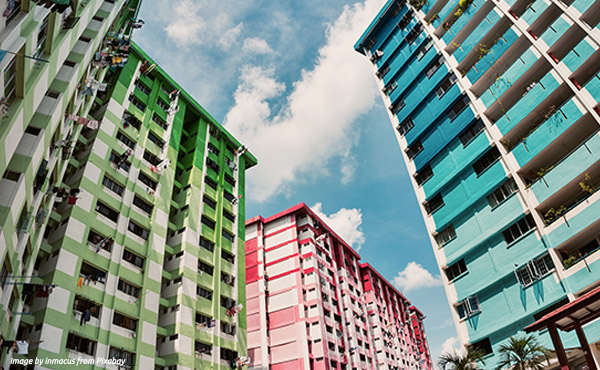
Overview of Inheriting HDB Property in Singapore
In Singapore, the process of inheriting a Housing Development Board (HDB) property involves various legal and financial considerations. These include understanding the tax implications, potential maintenance fees, property taxes, and potential restrictions due to existing property ownership. Further, the inheritance may also impact future property ownership and related costs.
Case Study: Inheriting a Property with Siblings

Inheriting a property with siblings can introduce additional complexities, particularly concerning potential stamp duty issues when transferring shares of the property. For instance, if a property is inherited equally by three siblings and one of them wants to transfer their share to another sibling, this transfer may attract stamp duty.
This case study highlights the importance of proper estate planning, especially when multiple beneficiaries are involved. By setting clear terms regarding the division and management of the property in the will, potential disputes and legal complications can be minimized.
Background on Inheritance Tax in Singapore
In Singapore, the abolishment of inheritance tax in 2008 has significantly simplified the process of inheriting properties, including HDB flats. Beneficiaries no longer have to worry about this tax, which has removed a considerable burden. This tax reform has been a significant relief for many Singaporeans, as it allows them to inherit properties without the additional financial burden of inheritance tax.
However, it’s essential to understand that the cessation of inheritance tax doesn’t imply that there are no other financial implications. Other costs such as maintenance fees, property taxes, and potential stamp duties may still apply. These costs will depend largely on the type of property, its location, and whether the beneficiary decides to keep or sell the property.
Stamp Duty Implications
One potential cost associated with inheriting a property in Singapore is stamp duty. Generally, beneficiaries do not need to pay stamp duty when inheriting a residential property. For instance, if a person inherits an HDB flat from a deceased parent, they would typically not be required to pay stamp duty on this transaction.
However, certain exceptions exist to this rule. These exceptions can lead to stamp duties being applicable under specific circumstances. For instance, if the beneficiary decides to sell the inherited property within three years of receiving it, they may need to pay Seller’s Stamp Duty (SSD). Similarly, if the beneficiary decides to purchase a new property after inheriting one, they may also need to pay stamp duty as well as ABSD, depending on the timing of the purchase and the type of property bought.
Maintenance Fees and Property Tax
Upon inheriting a property, beneficiaries are required to take over the responsibility of maintenance fees and property tax. For instance, if a person inherits a condo, they will need to cater to the regular maintenance fees for the upkeep of the common areas and facilities. These fees can sometimes be quite substantial, especially for private condos that offer a wide range of facilities.
Furthermore, property tax is another financial obligation that beneficiaries need to consider. This annual tax is imposed on all property owners in Singapore, regardless of whether the property was bought or inherited. The amount of property tax depends on the annual value of the property, which is determined by the potential rental income that the property can generate.
Mortgage Considerations
When inheriting a property with an outstanding mortgage, several considerations come into play. Legally, beneficiaries are not liable for the mortgage if the deceased was the sole borrower. This means that if the original property owner had taken out a mortgage loan on their own, the beneficiaries would not be required to pay off this loan.
However, if there is an outstanding mortgage on the inherited property, the Total Debt Servicing Ratio (TDSR) assessment will come into play. This assessment is conducted by the bank and takes into account the beneficiary’s income and other financial obligations to determine whether they are financially capable of servicing the mortgage. If the beneficiary fails this assessment, they may be unable to inherit the property, highlighting the importance of financial planning when dealing with property inheritance.
Restrictions and Eligibility Criteria
Inheriting an HDB flat in Singapore comes with certain restrictions and eligibility criteria. HDB rules may restrict beneficiaries from keeping an inherited HDB flat if they already own one. For instance, if a person already owns an HDB flat and then inherits another one, they may be required to sell off one of the flats within a specified period.
Similarly, restrictions also apply if a beneficiary owns a private property and inherits an HDB flat. This rule is in line with HDB’s regulations that prohibit the simultaneous ownership of an HDB flat and a private property within the Minimum Occupation Period (MOP). In such scenarios, the beneficiary may need to sell one of the properties to comply with HDB’s rules.
Impact on Future Property Ownership
Inheriting a property can impact future property ownership and potentially result in additional stamp duties or restrictions on buying new properties. For instance, if a person inherits an HDB flat, this will count towards the total number of properties they own. If they then decide to buy another residential property, they may be subject to Additional Buyer’s Stamp Duty (ABSD), which can add a significant cost to their property purchase.
Additionally, the inherited property may affect the beneficiary’s eligibility to purchase certain types of properties. For example, if a Singaporean inherits a private residential property, they must fulfil a five-year Minimum Occupation Period (MOP) before they are eligible to purchase an HDB flat.
Legal and Financial Considerations
There are several hidden costs and financial considerations to be aware of when inheriting a property. For example, if the inherited property is a condominium, the beneficiary will be responsible for paying monthly maintenance fees, which could be quite substantial depending on the facilities and amenities provided by the condominium.
Furthermore, it’s also critical to consider potential legal issues that may arise during the inheritance process. For instance, if any disputes arise among beneficiaries regarding the division of the property, legal fees may be incurred to resolve these issues. As such, it’s advisable for beneficiaries to have open discussions with their loved ones and seek legal advice if necessary to ensure a smooth inheritance process.
Conclusion
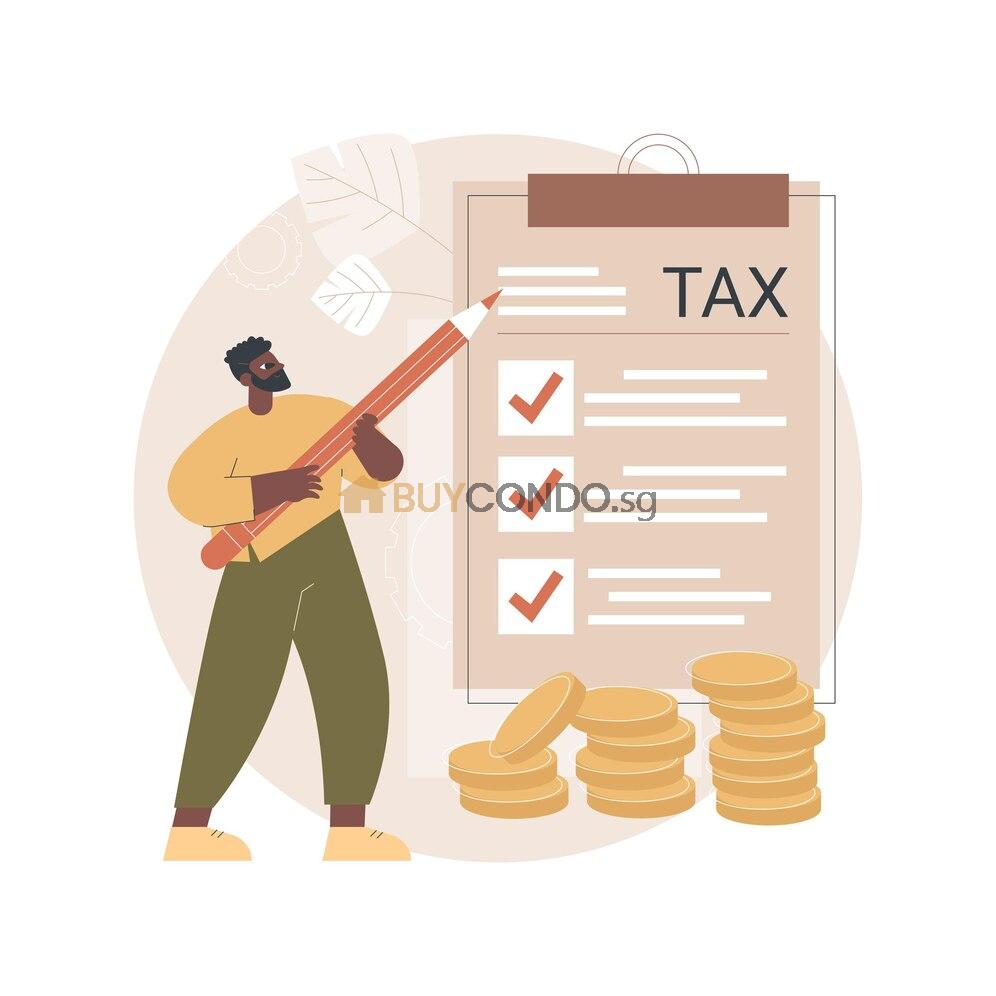
Inheriting an HDB property in Singapore involves various tax implications and considerations. Potential beneficiaries must be aware of these issues, which include the absence of inheritance tax, potential stamp duties, maintenance fees, and property taxes. Additionally, beneficiaries should also consider how the inherited property might affect their future property ownership and potential restrictions on keeping the inherited property. Lastly, seeking professional advice to navigate the complex legal and financial landscape surrounding property inheritance is always advisable.
The post Inheriting an HDB Property in Singapore: What Taxes Involved appeared first on Wing Tai Holdings Singapore.
]]>The post HDB Inheritance why is Important to do Estate Planning and Will appeared first on Wing Tai Holdings Singapore.
]]>A comprehensive guide to understanding the complex nature of HDB flat inheritance in Singapore, including the rules, eligibility criteria, and potential complications involved in the process.
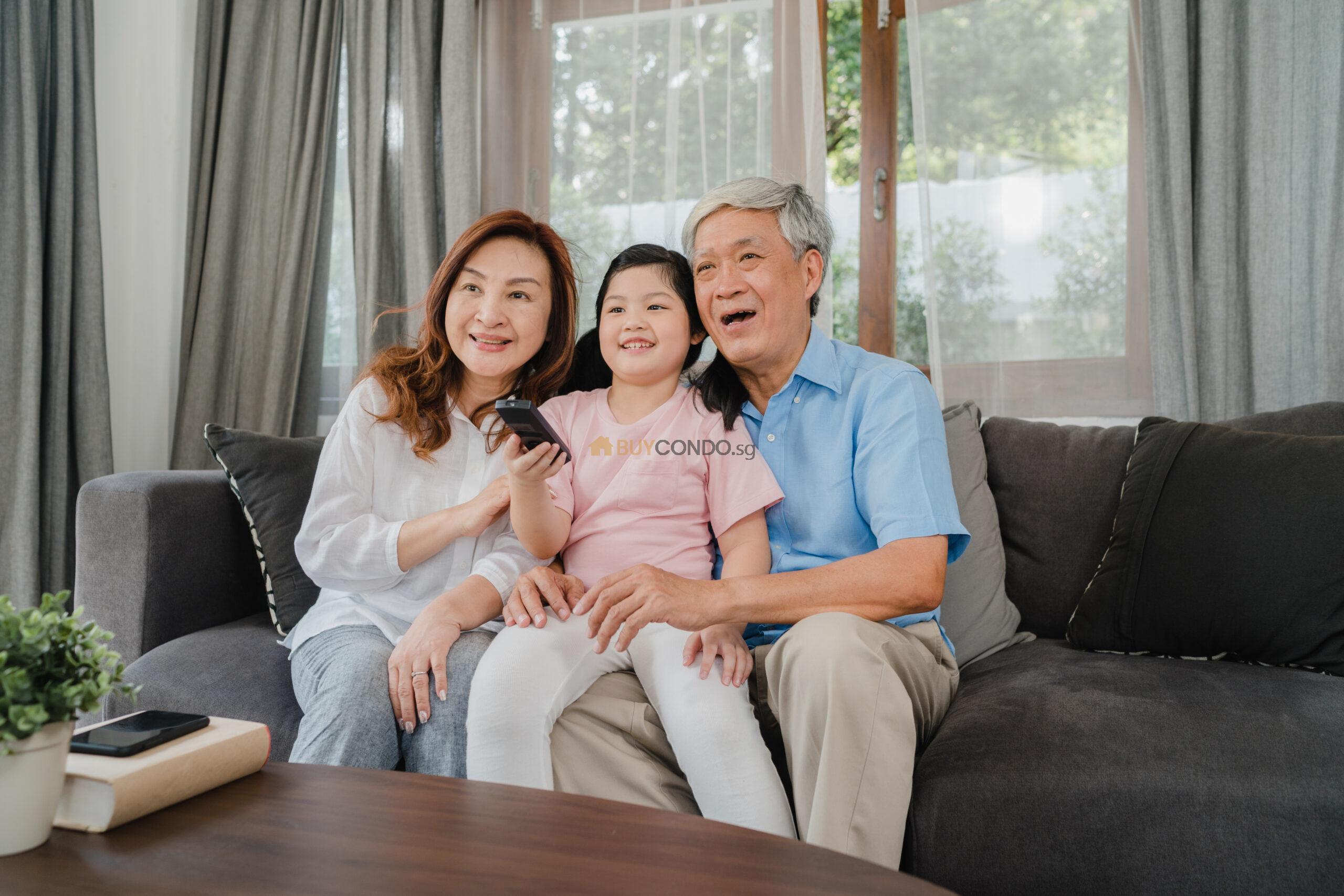
Overview of HDB Flat Inheritance in Singapore
The inheritance of HDB flats in Singapore is a multifaceted process that requires a thorough understanding of several key factors. This is because the eligibility for inheriting an HDB flat in Singapore is determined by various aspects, including the existence of a valid will and the status of other owners of the HDB flat. For instance, the proposed flat owners must navigate the complex eligibility rules, which encompass factors such as their relationship to the deceased, their age, their citizenship status, and whether they already own another HDB flat or private property. The interplay of these factors makes the inheritance of HDB flats a complex process that necessitates a deep understanding of the rules and regulations involved.
Moreover, the inheritance of HDB flats in Singapore is significantly influenced by the religious affiliation of the deceased owner. This is because different laws apply to Muslims and non-Muslims when it comes to HDB flat inheritance. Additionally, the type of ownership, such as joint tenancy or tenancy-in-common, also impacts the inheritance process. For instance, in the case of joint tenancy, the remaining co-owner automatically acquires the deceased’s share in the property. Conversely, in a tenancy-in-common scenario, the deceased’s share of the property can be distributed as per their will or, in the absence of a will, as per the Intestate Succession Act. With these intricate details at play, it becomes crucial to understand the nuances of HDB flat inheritance rules to ensure a smooth and legally compliant transition of ownership.
Understanding HDB Inheritance Rules
The inheritance of HDB flats in Singapore is governed by a comprehensive set of rules and regulations that are influenced by several factors. These include whether the deceased had a valid will and the status of other owners of the HDB flat. If the deceased left behind a valid will, the HDB flat will be distributed according to the provisions of the will. However, if there is no valid will, the inheritance process will follow the provisions of the Intestate Succession Act. This act outlines how assets should be distributed when an individual passes away without leaving a will.
Furthermore, it’s essential to understand that the inheritance of HDB flats in Singapore is subject to different laws based on the religious affiliation of the deceased. For Muslims, the distribution of property, including HDB flats, is governed by the Administration of Muslim Law Act. On the other hand, for non-Muslims, the inheritance process is governed by the Intestate Succession Act or the provisions of the deceased’s will. These differences in the legal framework underscore the necessity for individuals involved in the inheritance process to have an in-depth understanding of these laws to ensure compliance.
The type of ownership is another key factor that influences the inheritance process. Specifically, the concepts of joint tenancy and tenancy-in-common play a pivotal role in the inheritance of HDB flats. In the case of joint tenancy, the surviving owner(s) automatically inherit the deceased’s share of the property. By contrast, in a tenancy-in-common scenario, the deceased’s share of the HDB flat can be inherited as per their will or the Intestate Succession Act if there is no will. Therefore, understanding these ownership structures and their implications for HDB flat inheritance is crucial for individuals to navigate the process effectively and to ensure a seamless transition of ownership.
The Inheritance Process
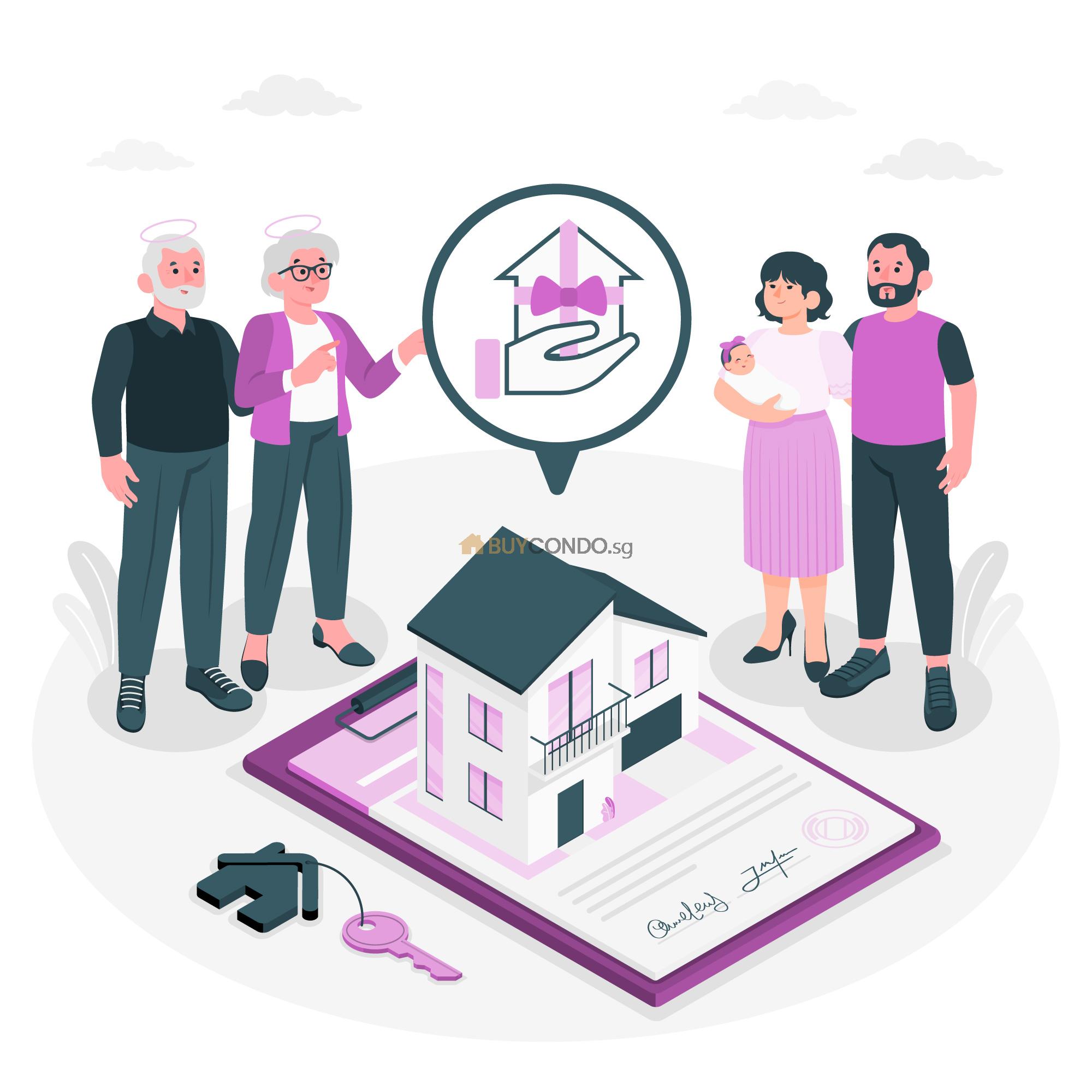
The process of inheriting an HDB flat in Singapore is a detailed and complex procedure requiring careful attention to several steps. The initial phase involves lodging a Notice of Death with the relevant authorities, which is crucial in initiating the official process of transferring the ownership of the HDB flat to the rightful beneficiaries. Upon lodging the Notice of Death, the next step involves obtaining a Grant of Probate or Letters of Administration. The Grant of Probate is required when the deceased had a valid will, while the Letters of Administration is necessary when the deceased passed away intestate, i.e., without leaving a will.
Furthermore, the eligibility criteria for proposed flat owners are an essential part of the inheritance process. These criteria include considerations such as the relationship of the heir to the deceased, the age of the heir, the citizenship status of the heir, and whether the heir owns another HDB flat or private property. These factors are thoroughly evaluated to ascertain the rightful beneficiaries of the HDB flat. In cases of intestacy, the inheritance process follows the Intestate Succession Act, which necessitates the application for the Grant of Letters of Administration. This legal document is essential for transferring the ownership of the HDB flat to the rightful heirs as per the laws governing intestate succession in Singapore.
Navigating the inheritance process requires a comprehensive understanding of these steps, as well as an awareness of potential complications that can arise. For instance, if the deceased owner left behind a valid will, the process would involve obtaining a Grant of Probate and executing the will according to its terms. However, if the owner died intestate, the process would become more complex, involving the application for Letters of Administration and distribution of the property as per the Intestate Succession Act. Therefore, it is crucial for individuals involved in the inheritance process to understand these complexities and to seek professional legal advice to navigate the process effectively and ensure a smooth transition of ownership.
Eligibility for Inheriting HDB Flat
In addition to these factors, retaining the flat after the death of a joint owner involves specific eligibility rules and conditions. These criteria include considerations such as the citizenship and age of the surviving owner, and whether they meet the eligibility conditions to own an HDB flat. For instance, if the deceased joint owner was a citizen of Singapore, the surviving joint owner would need to meet certain conditions to retain ownership of the flat. This might include demonstrating their ability to continue servicing the mortgage loan, among other things.
In certain cases, the beneficiary might already own private property or another HDB flat. In such instances, the beneficiary would need to decide between retaining the inherited flat or their existing property, as they would not be allowed to own both properties. Therefore, understanding these eligibility criteria and how they interact with specific circumstances is crucial for navigating the process of HDB flat inheritance.

Complexities in Inheritance
The inheritance process of an HDB flat can become complex under certain circumstances. For example, if the beneficiary already owns private or commercial property, this can complicate the inheritance process. In such cases, the beneficiary would need to sell one of the properties within a stipulated time period, as per HDB regulations. This can create additional financial and logistical considerations for the beneficiary.
Furthermore, the existence of informal arrangements related to mortgage payments can add further complexity to the inheritance process. If there are informal agreements among family members or co-owners about who is responsible for mortgage payments, this could lead to misunderstandings during the inheritance process. Therefore, it is essential to resolve such informal arrangements and clearly document financial responsibilities to avoid complications.
Conflicts among surviving family members or co-owners can also complicate the inheritance process. These conflicts can arise due to disagreements over the distribution of assets, differing interpretations of the deceased owner’s intentions, or disputes regarding the management of the inherited property. Such conflicts can potentially delay the inheritance process, strain relationships among the involved parties, and could even lead to legal disputes. Therefore, it is crucial to seek professional legal advice to help navigate potential conflicts and ensure a smooth inheritance process.
Inheritance of Minors and Family Structures
In the context of HDB flat inheritance in Singapore, the rights of minors to inherit a property is a key consideration. For instance, if the deceased owner left behind a minor as a beneficiary, the inheritance process becomes more intricate. Under the law, a minor can inherit an HDB flat under the deceased’s final will or under the Intestate Succession Act. However, until the minor reaches the age of majority, a legal guardian will manage the inherited property on their behalf.
Furthermore, the rules regarding the inheritance of HDB flats take into consideration various family structures. For instance, in the event of a divorce with children, different rules apply compared to a divorce without children. The nuances in eligibility criteria based on family structures underscore the complexity of HDB flat inheritance and the importance of understanding the specific rules and regulations to ensure a seamless transfer of ownership.
Family structures can also change after a life event, such as a divorce or the death of a spouse, which can affect the eligibility to retain the inherited flat. In such cases, the remaining owners must meet certain eligibility rules and conditions to retain the flat. These rules take into account factors such as the remaining owners’ citizenship status, age, and financial capacity to continue servicing the mortgage loan. Thus, understanding how changes in family structures affect HDB flat inheritance is crucial for ensuring a smooth transition of ownership.

Selling of HDB Flat After Death
The sale of an HDB flat after the death of the owner is a process that demands careful consideration and understanding of HDB’s regulations. This process can vary depending on the type of ownership and whether a valid will exists. For example, if the deceased owner held the property under joint tenancy, the surviving owner automatically absorbs the deceased’s share under the right of survivorship.
However, if the deceased owner has specified in their will that the property should be sold, the executor of the will has to adhere to these instructions. In the case of tenancy-in-common, each co-owner has a distinct share in the property. In this scenario, the deceased owner’s share will be distributed according to their will or the Intestate Succession Act if there is no will.
In the absence of a will, the process of selling the HDB flat becomes more complex, as the distribution of the flat will be governed by the Intestate Succession Act. This necessitates the application for the Grant of Letters of Administration, which allows the court-appointed administrator to manage and distribute the deceased’s estate. Hence, understanding these regulations and processes is crucial for individuals involved in the sale of an inherited HDB flat. It is always advisable to seek legal advice to navigate these complexities and ensure compliance with the relevant regulations.
Importance of Legal Advice and Estate Planning
Given the complexities and nuances associated with HDB inheritance, having a will and seeking legal advice are paramount. Engaging a specialist lawyer can provide individuals with the necessary guidance to comprehend HDB inheritance and ensure compliance with the inheritance processes. This is particularly important given the numerous factors that can impact the inheritance process, such as the existence of a will, the type of property ownership, and the specific family circumstances of the deceased.
In addition to legal advice, estate planning is a crucial aspect of HDB inheritance. Estate planning involves making arrangements for the transfer of one’s estate upon death, with the aim to minimize potential disputes and ensure that the intended beneficiaries receive their rightful inheritance. It allows an individual to specify in their will how they want their HDB flat to be inherited, taking into account their specific wishes and the needs of their family.
Moreover, estate planning can also encompass financial and healthcare directives, ensuring that the individual’s wishes regarding medical treatment and the management of their finances are clearly outlined in the event of incapacity. This comprehensive approach to estate planning not only aids in the smooth transfer of assets, including HDB flats, but also offers peace of mind to the individual and their loved ones during challenging times. Therefore, legal advice and estate planning play a pivotal role in safeguarding the interests of individuals and their families in the context of HDB inheritance.
Conclusion
In conclusion, the inheritance of HDB flats in Singapore is a complex process that requires a comprehensive understanding of myriad rules and procedures. By gaining a thorough understanding of eligibility criteria, the inheritance process, and potential complexities, individuals can effectively navigate the intricacies of HDB flat inheritance, ensuring a smooth and equitable transition of ownership.
A specific case study shows the importance of knowing the eligibility criteria for inheriting an HDB flat. In a scenario where an individual inherits an HDB flat but already owns another property, they would need to adhere to the eligibility conditions, including the sale of one of the properties to comply with HDB regulations. This highlights the complexities involved and the need for potential beneficiaries to understand and comply with the rules of HDB flat inheritance.
Furthermore, the complexities in inheritance, such as informal arrangements about mortgage payments and potential conflicts among surviving family members or co-owners, underscore the significance of being well-versed in the process. For example, in situations where family members have informal agreements about mortgage payments or face disputes regarding the inheritance process, seeking legal advice becomes imperative to resolve these complexities and ensure a fair distribution of assets.
In essence, understanding the complexities and nuances of HDB flat inheritance in Singapore is crucial. This understanding will aid individuals and families in making informed decisions, navigating the intricate landscape of HDB flat inheritance, and ensuring a smooth and equitable transition of ownership.
The post HDB Inheritance why is Important to do Estate Planning and Will appeared first on Wing Tai Holdings Singapore.
]]>The post Should I Keep or Sell My HDB? Exploring Options While Renting a Condo appeared first on Wing Tai Holdings Singapore.
]]>Should I Keep or Sell My HDB? Exploring Options While Renting a Condo? Deciding whether to keep or sell your HDB (Housing Development Board) while renting a condo can be a challenging decision. There are several factors to consider, including the resale value of your HDB, the potential rental yield, and the comparison between HDB and condo living. This article will provide insights and analysis to help you make an informed choice.
Key Takeaways:
- Consider the resale value of your HDB when deciding whether to keep or sell.
- Explore the potential rental yield of your HDB versus the costs and benefits of renting a condo.
- Analyze the differences between HDB and condo living to determine which option aligns with your housing preferences.
- Take into account the current property market analysis and trends when making your decision.
- Seek financial advice to understand the long-term implications and potential benefits of owning versus renting property.
Reach Out to WING TAI HOLDINGS Team for a Non Obligation Discussion. WA for an appointment at +6594507545.
Can I Rent Out My HDB and Stay in a Condo?
As a homeowner in Singapore, you may be wondering if it’s possible to rent out your HDB flat while staying in a condo. The answer is yes, but there are certain regulations and conditions to be aware of. Firstly, your HDB flat must fulfill a minimum occupancy period (MOP) of five years before you can consider renting it out. This means that you need to stay in your HDB flat for at least five years before you can explore the option of renting it out while staying in a condo.
In addition to the minimum occupancy period, the number of occupants and citizenship status can also impact the rental possibilities. Renting out the entire HDB flat is only permissible for Singapore citizens, with certain quotas for renting to non-citizens. This is to ensure that there is a balance between providing housing opportunities for citizens and maintaining a stable housing market.
It’s important to note that if you are a Singapore citizen and decide to keep your HDB flat while purchasing a private condominium, you will be subject to additional buyer’s stamp duty (ABSD). The ABSD is a tax imposed on Singapore citizens who own more than one residential property. Therefore, it’s essential to consider the financial implications and regulatory requirements before making a decision on renting out your HDB while staying in a condo.
Rental Regulations for HDB and Condo
| Rental Regulations | HDB | Condo |
|---|---|---|
| Minimum Occupancy Period (MOP) | 5 years | N/A |
| Rental Possibilities | Singapore citizens and certain quotas for non-citizens | Singapore citizens and non-citizens |
| Additional Buyer’s Stamp Duty (ABSD) | Not applicable | Applicable for Singapore citizens owning more than one residential property |
As you navigate the decision of renting out your HDB and staying in a condo, it’s advisable to consult with professionals who can provide guidance on the Singapore regulations and offer insights specific to your unique situation. Reach out to WING TAI HOLDINGS Team for a non-obligation discussion and schedule an appointment at +6594507545.
Advantages and Disadvantages of Renting Out HDB and Staying in a Condo
When it comes to deciding whether to rent out your HDB and stay in a condo, there are several advantages and disadvantages to consider. Renting out your HDB can provide financial gain through rental income and potential tax benefits. It allows you to leverage your property as an asset for appreciation and offers flexibility in your living arrangements. Additionally, retaining both properties gives you the opportunity to diversify your investment portfolio and enjoy an enhanced lifestyle with access to amenities and facilities that condos often offer.
However, there are also financial risks and challenges associated with renting out your HDB and staying in a condo. High initial costs, such as the additional buyer’s stamp duty (ABSD), can impact your cash flow and overall affordability. Managing the maintenance and management of two properties can be demanding and time-consuming. It’s essential to comply with rental regulations and ensure regulatory compliance to avoid potential penalties. Market volatility can also affect the rental demand and rental income you derive from your HDB. Lastly, tenant-related issues, such as non-payment of rent or property damage, can add additional stress and complications to the rental process.
In summary, renting out your HDB while staying in a condo offers potential financial gain, flexibility, and investment diversification. However, it also presents financial risks, maintenance and management challenges, regulatory compliance obligations, market volatility, and tenant-related issues. Each individual’s situation is unique, and it’s essential to carefully assess your personal circumstances and seek professional advice to make an informed decision that aligns with your long-term goals and objectives.
Table: Advantages and Disadvantages of Renting Out HDB and Staying in a Condo
| Advantages | Disadvantages |
|---|---|
| Financial gain through rental income | Top up a bit more and enjoy condo facilities |
| Tax benefits | Dual responsibilities for maintenance and management |
| High Yield | Regulatory compliance and potential penalties |
| Flexibility in living arrangements | Market volatility |
| Investment diversification | Tenant-related issues |
| Enhanced lifestyle with access to amenities |
Reach out to the WING TAI HOLDINGS Team for a non-obligation discussion about your specific situation. Book an appointment via WhatsApp at +6594507545.
Options for Upgrading from HDB to Condo
When considering the upgrade from an HDB to a condo, there are different options to explore. Each option has its own pros and cons, and it’s important to carefully evaluate them based on your specific circumstances and goals.
One option is to sell your HDB first before buying a condo. This allows you to fully utilize your CPF (Central Provident Fund) savings and take full loans for the condo purchase. It provides you with more financial flexibility and may result in a lower cash outlay. However, it also means you’ll need to secure a temporary place to stay during the transition period.
Alternatively, you can choose to buy the condo first and then sell your HDB. This option provides you with the peace of mind of having a secured place to stay while waiting for the completion of the condo. It also allows you to plan and carry out any necessary renovations before moving in. However, this option may pose challenges in terms of cash flow, as you’ll need to manage the financial commitment of both properties simultaneously.
| Option | Pros | Cons |
|---|---|---|
| Sell HDB First | – Fully utilize CPF savings – Lower cash outlay |
– Temporary place to stay – May need to rent during transition |
| Wing Tai Holdings First | – Secured place to stay – Renovation planning |
– Simultaneous financial commitment – Cash flow challenges |
Another option is the hybrid method, where you buy and sell concurrently. This approach requires careful timeline planning and coordination with real estate agents to ensure a seamless transition. It allows for a smooth handover from your HDB to the new condo without the need for temporary accommodations. However, it can be more complex and requires meticulous management of the buying and selling processes.
Regardless of the option you choose, it’s essential to consider factors such as cash flow, loan limitations, CPF utilization, and the potential need for renting during the transition period. Consulting with a financial advisor or property expert can provide valuable guidance tailored to your specific situation. They can help you assess the advantages and disadvantages of each option and make an informed decision that aligns with your goals and financial capacity.
Assessing the Value of Your HDB
When considering whether to keep or sell your HDB while renting a condo, it is crucial to assess the value of your HDB. Several factors can impact the value, including location, market trends, and amenities. Staying updated on the latest information related to million dollar HDBs, and the concept of Cash Over Valuation (COV) can provide valuable insights into the potential value of your HDB.
Understanding the value of your HDB is essential for making an informed decision. The resale value of your HDB can influence your financial commitments and future property assessment. By unlocking the value of your HDB, you can determine its potential for appreciation and assess whether it aligns with your long-term goals and financial aspirations.
| Factors Influencing HDB Value | Impact |
|---|---|
| Location | The desirability of the neighborhood and proximity to amenities can increase the value of your HDB. |
| Market Trends | Understanding current market trends can help you gauge the potential value of your HDB in the future. |
| Amenities | The presence of nearby amenities such as schools, shopping centers, and parks can enhance the value of your HDB. |
By carefully assessing the value of your HDB, you can make an informed decision about its future. Whether you choose to keep or sell, understanding the financial implications and property assessment is crucial. Reach out to the WING TAI HOLDINGS team for a non-obligation discussion and to explore your options. Contact us today at +6594507545 to schedule an appointment.
Quote:
“Assessing the value of your HDB is an essential step in making an informed decision about whether to keep or sell. By understanding the factors that influence the value, such as location, market trends, and amenities, you can determine the potential for appreciation and align your decision with your long-term goals.”
Financial Planning for Upgrading to a Condo
When considering upgrading from an HDB to a condo, careful financial planning is essential. The transition brings various financial commitments that need to be evaluated and managed effectively to ensure a smooth upgrade process. Here’s a breakdown of the key aspects to focus on:
- Budgeting: Assess your current financial situation and determine how much you can afford to allocate towards the condo purchase. Consider your income, savings, and other financial obligations to create a realistic budget.
- Loan Options: Explore different loan options available for purchasing a condo. Compare interest rates, loan tenure, and eligibility criteria to find the best financing solution that suits your needs.
- Down Payment: Determine the down payment amount required for the condo purchase. It typically ranges from 20% to 30% of the property’s purchase price. Ensure you have sufficient funds or savings set aside for the down payment.
- Affordability: Evaluate whether the monthly mortgage payments for the condo, including interest and other expenses, are affordable within your budget. Take into account any potential changes in income or financial circumstances in the future.
- Financial Consultation: Consider seeking advice from a financial consultant or mortgage specialist who can provide guidance tailored to your specific goals and financial situation. They can help you navigate through the complexities of upgrading to a condo and make sound financial decisions.
- Future Goals: Align your property upgrade with your long-term financial goals. Consider factors such as investment potential, property appreciation, and the impact on your overall financial portfolio.
- Property Investment: Assess the potential of the condo as a property investment. Research the market trends, rental demand, and potential rental yield to make an informed decision that aligns with your investment goals.
By carefully considering your financial commitments, budgeting, loan options, down payment, affordability, and future goals, you can make a well-informed decision about upgrading from an HDB to a condo, ensuring a smooth transition and a sound financial future.
Reach out to the WING TAI HOLDINGS team for a non-obligation discussion and appointment by WhatsApp at +6594507545.
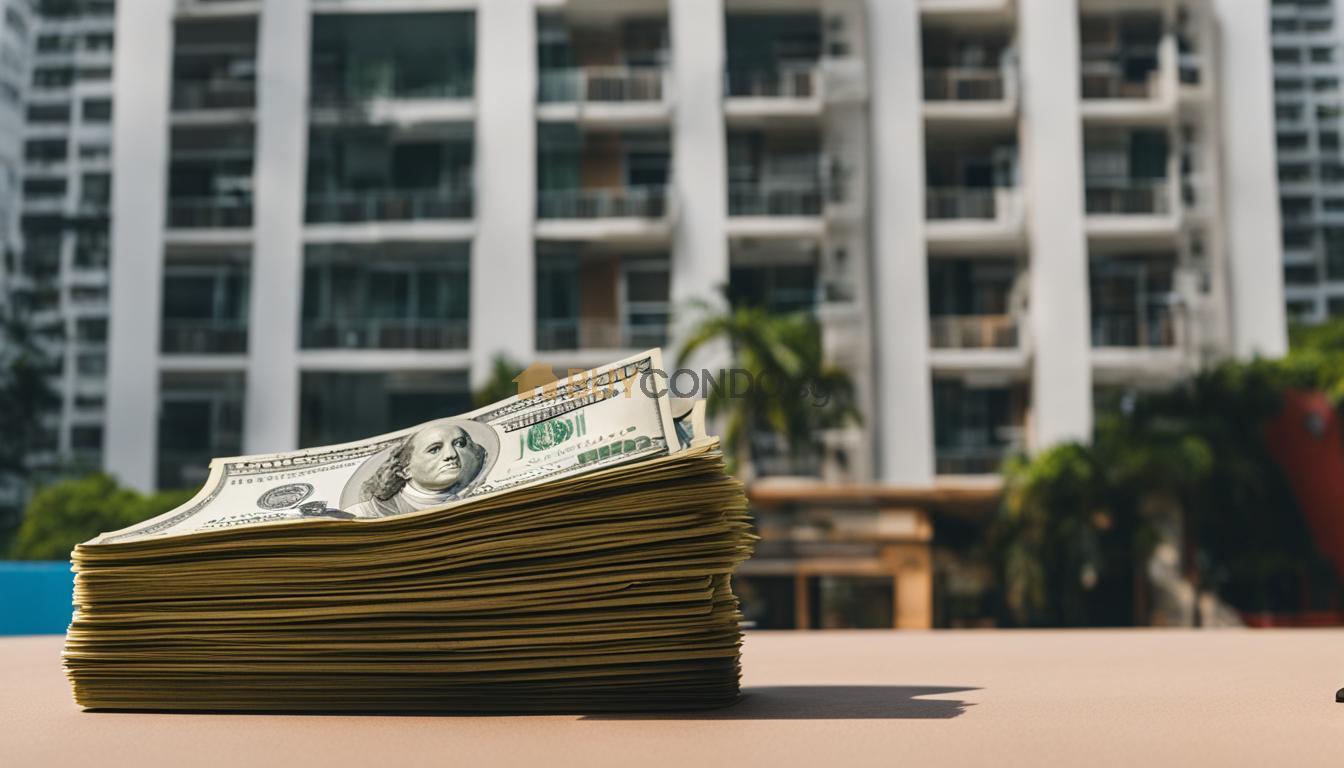
Making a Long-Term Housing Decision
When it comes to making a long-term housing decision, there are several factors to consider. First, you need to evaluate your lifestyle preferences. Do you prefer the convenience and amenities that come with staying in a condo, or do you value the community atmosphere and familiarity of your HDB? Understanding your personal preferences will help guide your decision.
Financial stability is another important aspect to consider. Assess your financial situation and determine if you have the means to own and maintain a condo. Consider the costs associated with condo ownership, such as monthly maintenance fees and property taxes. Additionally, think about the potential rental income you could generate from renting out your HDB and weigh it against the costs of owning and renting a condo.
Conducting a rental market analysis is crucial to understanding the current demand and rental rates in your area. This analysis will help you gauge the potential rental income you could earn from your HDB and determine if it aligns with your long-term financial goals. Additionally, consider the property ownership aspect. Owning a condo provides the potential for property appreciation over time, whereas renting may provide more flexibility in terms of where you live.
Table: Comparing HDB and Condo Options
| Aspect | HDB | Condo |
|---|---|---|
| Affordability | Lower upfront costs and monthly expenses | Higher upfront costs and monthly expenses |
| Ownership | Full ownership with restrictions on rental | Full ownership with potential for rental income |
| Amenities | Basic facilities within HDB estate | Luxurious amenities and facilities |
| Community | Tighter-knit community and sense of familiarity | More transient community |
| Flexibility | Less flexibility in terms of living arrangements | More flexibility in terms of changing locations |
Ultimately, your long-term goals and future planning should guide your housing decision. Consider where you see yourself in the next five to ten years and how owning or renting a condo will align with those goals. Reach out to the WING TAI HOLDINGS team for a non-obligation discussion to explore your options further. You can schedule an appointment by reaching out via WhatsApp at +6594507545.
Seek Professional Advice for Property Transitions
When it comes to making important property decisions, seeking professional advice from property experts, real estate agents, and financial advisors is crucial. These professionals have in-depth knowledge and experience in the property market, and they can provide valuable insights to help you navigate the complex process of property transitions.
Property experts can offer comprehensive property market analysis, evaluating market trends, property valuation, and rental yield analysis. They can help you understand the current market conditions and make informed decisions based on your specific goals and circumstances.
Real estate agents are well-versed in the legal implications of property transitions. They can guide you through the buying or selling process, ensuring that you understand all the tax considerations and legal requirements. They can also help you find suitable properties, negotiate deals, and handle all the necessary paperwork.
Financial advisors play a crucial role in property transitions by providing valuable financial insights and advice. They can assess your financial situation, help you create a budget, explore loan options, and determine the affordability of your desired property. They can also assist in long-term financial planning and align your property decisions with your overall financial goals.
Reach out to the WING TAI HOLDINGS team for a non-obligation discussion with property experts, real estate agents, and financial advisors. They can provide you with personalized guidance and support, ensuring that your property transitions are smooth, informed, and successful. Contact them today and take the first step towards making wise property decisions that align with your needs and aspirations. WA for an appointment at +6594507545.
Exploring the Future of Property Ownership
As the real estate industry evolves, it’s essential to stay informed about the latest property trends, housing market analysis, and real estate innovations. The future of property ownership holds exciting possibilities, with advancements in sustainable living, technology, and community-focused developments.
The Rise of Smart Homes
Technology advancements have paved the way for the rise of smart homes, which offer enhanced convenience and efficiency. From automated lighting and temperature control to integrated security systems, smart homes provide a seamless living experience. Homeowners can enjoy the benefits of remote management and energy conservation, making smart homes an attractive proposition for future property ownership.
Embracing Sustainable Living
With increasing awareness of environmental concerns, sustainable living has become a significant focus in the real estate industry. Green buildings and eco-friendly features such as solar panels and rainwater harvesting systems are increasingly prevalent. Property owners can contribute to a greener future by choosing environmentally conscious developments and reducing their carbon footprint.
Community-Focused Developments
Community living is gaining prominence as developers create integrated developments that cater to residents’ needs. These developments often feature amenities such as parks, community centers, and shared spaces that foster a sense of belonging and promote social interaction. Embracing community-focused developments can enhance the quality of life for property owners and create vibrant, inclusive neighborhoods.
| Property Trends | Housing Market Analysis | Real Estate Innovations |
|---|---|---|
| – Rising demand for sustainable and energy-efficient properties. | – Analyzing market trends and property values to make informed investment decisions. | – Incorporating cutting-edge technology in property design and construction. |
| – Shift towards flexible living spaces to accommodate remote work and lifestyle changes. | – Evaluating supply and demand dynamics in different housing segments. | – Exploring new construction methods and materials for sustainable and cost-effective building. |
| – Increasing interest in co-living and co-working spaces to foster collaboration. | – Assessing the impact of government policies and regulations on the real estate market. | – Implementing innovative property management systems for improved efficiency. |
As property ownership evolves, staying informed about these trends, market analysis, and real estate innovations is crucial. By embracing sustainable living, leveraging technology advancements, and exploring community-focused developments, property owners can make informed decisions that align with their future aspirations.
To explore the exciting possibilities of the future of property ownership, reach out to the WING TAI HOLDINGS Team for a non-obligation discussion. Contact us via WhatsApp at +6594507545 to schedule an appointment.
Conclusion
After carefully considering the financial implications, analyzing the real estate market, and exploring your housing options, it’s time to make a decision about whether to keep or sell your HDB while renting a condo. This crucial property decision involves weighing factors such as rental income, asset appreciation, financial risks, regulatory compliance, and lifestyle preferences.
To ensure you make the best decision for your unique situation, it is highly recommended to seek professional advice. Reach out to the WING TAI HOLDINGS Team for a non-obligation discussion. Their property experts can provide valuable insights into the property market, assist with property valuation, rental yield analysis, and guide you through tax considerations and legal implications.
Remember, your property decisions should align with your long-term goals and future planning. Consider the ever-changing housing market and the evolving trends and innovations in the real estate industry. By staying informed and seeking expert advice, you can navigate the complexities of property ownership and make informed choices that maximize your financial gains and enhance your lifestyle.
For a non-obligation discussion, reach out to the WING TAI HOLDINGS Team today. Schedule an appointment by contacting them on WhatsApp at +6594507545. Take control of your property decisions and secure your future in the Singapore real estate market.
FAQ – Should I Keep or Sell My HDB?
Can I rent out my HDB and stay in a condo?
Yes, it is possible to rent out your HDB flat while staying in a condo. However, there are certain conditions and regulations to be aware of. The HDB flat must fulfill a minimum occupancy period (MOP) of five years before considering renting it out. The number of occupants and citizenship status also have an impact on the rental possibilities. Additional buyer’s stamp duty (ABSD) applies if a Singapore citizen decides to keep their HDB flat and purchase a private condominium. The rental of the entire HDB flat is only permissible for Singapore citizens, with certain quotas for renting to non-citizens.
What are the advantages and disadvantages of renting out HDB and staying in a condo?
Renting out your HDB while staying in a condo offers several advantages. It can provide a steady stream of rental income and potential tax benefits. Retaining both properties allows for asset appreciation and flexibility in living arrangements. It also provides an opportunity for investment diversification and access to enhanced amenities and facilities. However, there are disadvantages to consider, such as high initial costs, dual responsibilities for maintenance, compliance with rental regulations, market fluctuations, and tenant-related issues.
What are the options for upgrading from HDB to condo?
There are different options to consider when upgrading from an HDB to a condo. Selling the HDB first allows for fully utilizing CPF and taking full loans for the condo purchase. On the other hand, buying the condo first provides peace of mind with a secured place and time for renovations. However, it comes with the challenge of cashflow and loan limitations. The hybrid method involves buying and selling concurrently, requiring careful timeline management and coordination with real estate agents. Renting during the transition period can provide more options for the next property, but it may also involve the hassle of moving house twice.
How can I assess the value of my HDB?
Assessing the value of your HDB is crucial when considering whether to keep or sell it. Factors such as location, market trends, and amenities can impact the value of your HDB. It’s important to stay updated on the latest information related to million dollar HDBs, popular HDB towns, and the concept of Cash Over Valuation (COV). Understanding the potential value of your HDB can help you make an informed decision about its future.
How should I plan financially for upgrading to a condo?
Upgrading from an HDB to a condo requires careful financial planning. It is essential to assess your financial commitments, create a budget, and explore loan options for the condo purchase. Determining the down payment and ensuring affordability are crucial considerations. Seeking financial consultation can provide guidance based on your future goals and aspirations. Additionally, it’s important to evaluate the potential of the condo as a property investment.
How do I make a long-term housing decision?
Deciding whether to keep or sell your HDB while renting a condo requires evaluating your long-term housing decision. Consider your lifestyle preferences, financial stability, and the rental market analysis. Assess the benefits of property ownership versus renting, and align your decision with long-term goals and future planning. It’s crucial to determine the affordability of both options and make a choice that aligns with your overall financial and lifestyle objectives.
Should I seek professional advice for property transitions?
Yes, seeking professional advice is recommended when considering property transitions. Property experts, real estate agents, and financial advisors can provide valuable insights based on property market analysis, property valuation, rental yield analysis, tax considerations, and legal implications. Their expertise can help you make informed decisions and maximize the benefits of your property decision-making process.
What is the future of property ownership?
Exploring the future of property ownership involves staying updated on property trends, housing market analysis, and real estate innovations. Consider the potential impact of sustainable living, technology advancements, smart homes, green buildings, and community living. Keeping abreast of the evolving landscape can help shape your property ownership decisions and ensure they align with the changing needs and preferences of the housing market.
How do I decide whether to keep or sell my HDB while renting a condo?
Deciding whether to keep or sell your HDB while renting a condo involves weighing the financial implications, analyzing the real estate market, and considering your housing options. It’s crucial to consider factors such as rental income, asset appreciation, financial risks, regulatory compliance, and lifestyle preferences. Ultimately, seeking professional advice and thoroughly evaluating your personal circumstances will help guide you towards the best decision for your unique situation.
The post Should I Keep or Sell My HDB? Exploring Options While Renting a Condo appeared first on Wing Tai Holdings Singapore.
]]>The post How to apply HDB HFE Steps (9 May 2023) appeared first on Wing Tai Holdings Singapore.
]]>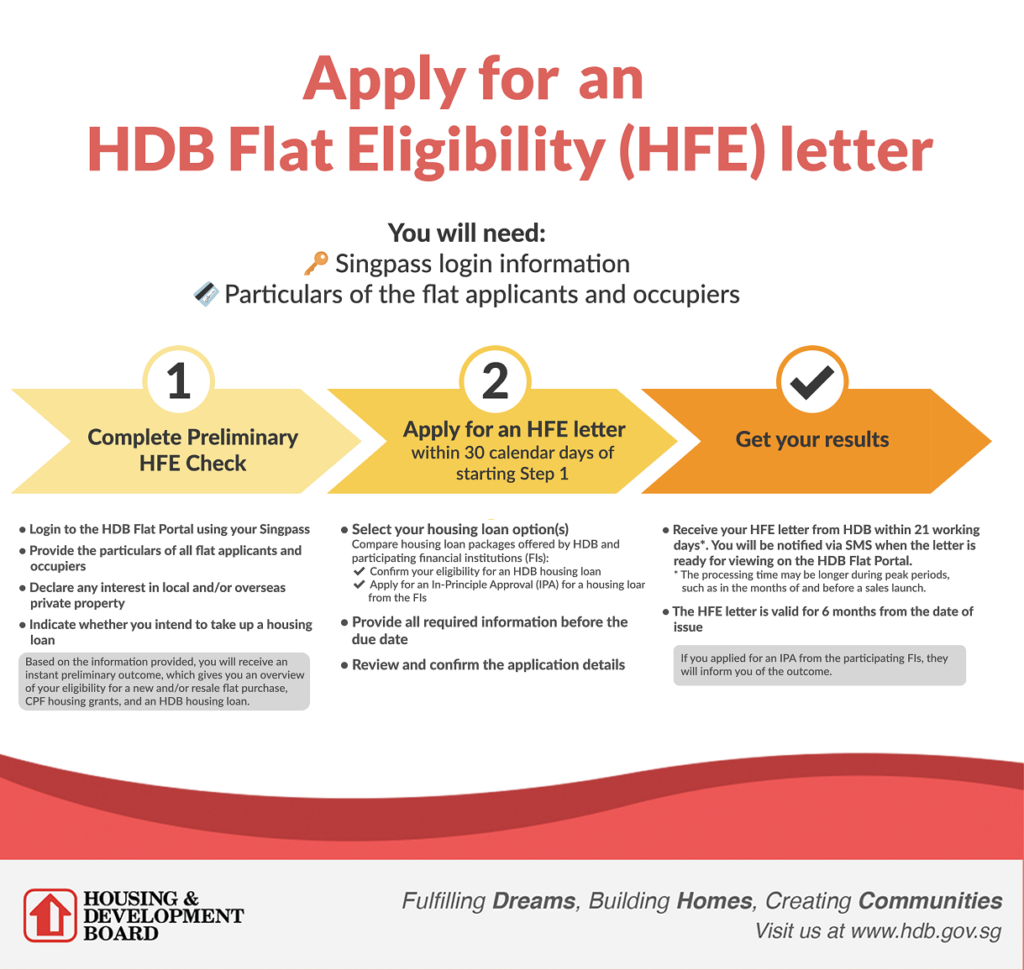
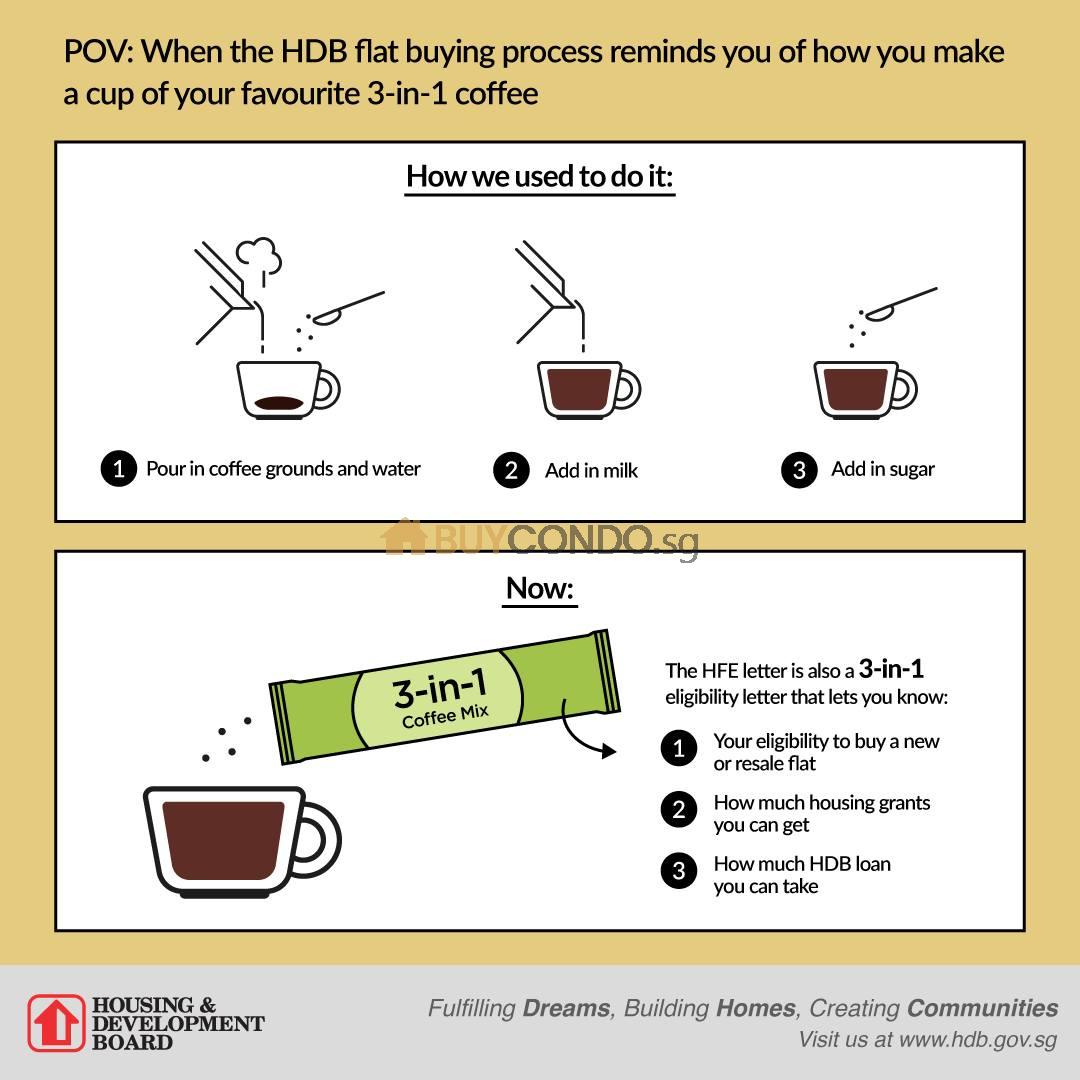
Updates : 23/11/2023 Please note changes on the HFE applicant occupiers is not allowed.
Thinking of buying an HDB flat soon? You will need an HDB Flat Eligibility (HFE) Letter before you set off on your home-buying journey. HFE letter streamlines the flat buying process. With the HFE letter, you will know upfront your eligibility to:
- Buy a new and/ or resale flat
- Receive CPF housing grants and the amount
- Take up an HDB housing loan, and the amount
 If you are interested in taking up a loan from a financial institution (FI), you can also concurrently apply for an In-Principle Approval from participating FIs when applying for an HFE letter. The letter will also give you an indicative loan assessment.
If you are interested in taking up a loan from a financial institution (FI), you can also concurrently apply for an In-Principle Approval from participating FIs when applying for an HFE letter. The letter will also give you an indicative loan assessment.
When will I need an HFE letter?
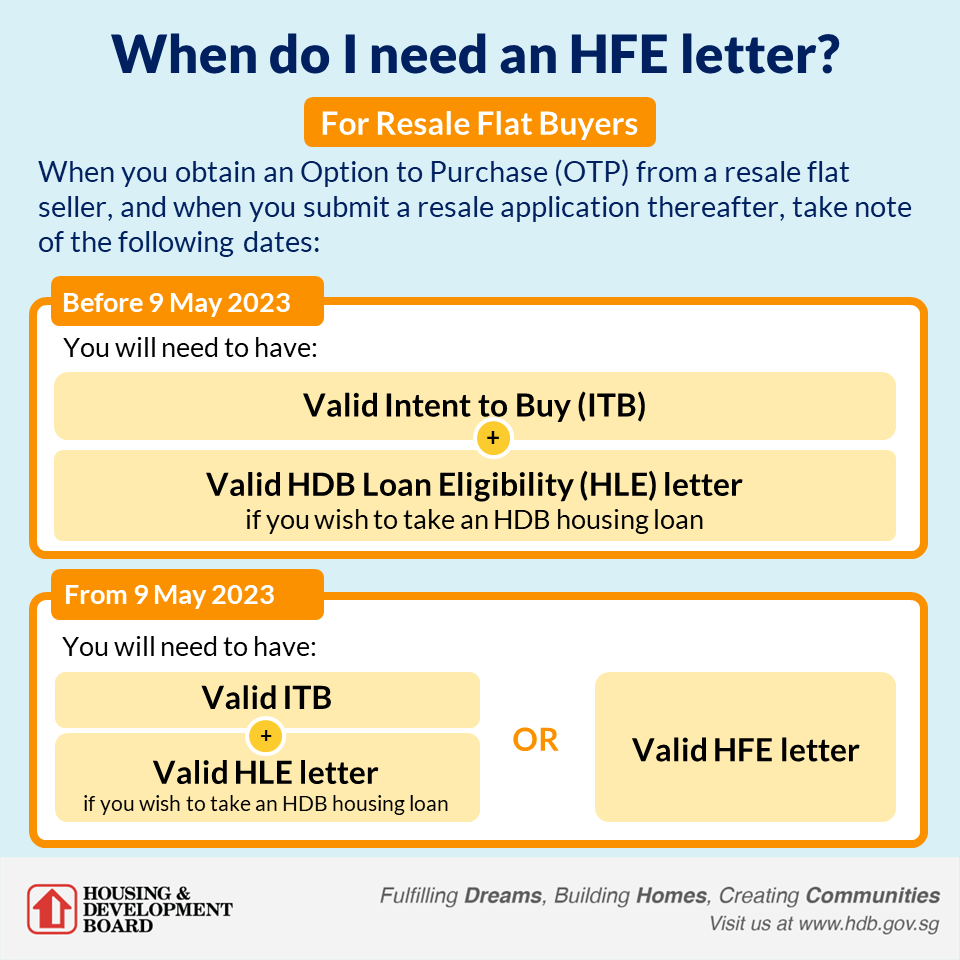
You will need a valid HFE letter when you:
- Apply for a flat from HDB during a sales launch or open booking of flats
- Obtain an Option to Purchase from a flat seller for a resale flat and when you submit a resale application to HDB.
 The HFE letter helps you make an informed decision and reduces the guesswork as you plan the budget for your flat. We encourage you to plan ahead and apply for the HFE letter early – after all, the HFE letter is valid for 6 months.
The HFE letter helps you make an informed decision and reduces the guesswork as you plan the budget for your flat. We encourage you to plan ahead and apply for the HFE letter early – after all, the HFE letter is valid for 6 months.
What happened to the HLE letter?
The HFE letter replaces the old HDB Loan Eligibility (HLE) letter. Whereas buyers’ eligibility to buy an HDB flat, receive grants, and take up a housing loan used to be assessed at various stages in the flat-buying journey, the process is now streamlined into a single application for greater convenience.
If you are currently in the midst of buying a flat, learn more about whether and when you would need an HFE letter.
How do I apply for an HFE letter?
There are just 2 steps to apply for an HFE letter:
- Step 1: Preliminary HFE Check. Based on the information you provide, you will receive a quick overview of your eligibility to buy an HDB flat, receive CPF housing grants, and take up an HDB housing loan. This is a preliminary assessment to guide your financial planning. If you have decided to buy a flat, proceed to the next step to apply for an HFE letter.
- Step 2: Apply for an HFE Letter. Note that you will need to apply for an HFE letter within 30 calendar days of starting the preliminary HFE check. If not, you will need to start the preliminary HFE check afresh. You can use your HFE letter to work out your flat budget before beginning your home search.
 If you can, apply for the HFE letter within the same calendar month that you started the preliminary HFE check. Otherwise, you will need to update the employment details for all persons listed in your application.
If you can, apply for the HFE letter within the same calendar month that you started the preliminary HFE check. Otherwise, you will need to update the employment details for all persons listed in your application.
You will be guided along both Step 1 and Step 2 by the HDB Flat Portal. Remember to have the required information (e.g. Singpass login info and details of all applicants and/ or occupiers) ready for a smoother process.
Read on to understand what you need to note for each step in the HFE process.
| Step 1: Preliminary HFE check Provide your household particulars and income details Submit declarations State housing loan intent Review details and receive preliminary HFE assessmentStep 2: Apply for an HFE letter Choose loan options Provide additional details Review details Upload documents Submit application |
Step 1: Preliminary HFE Check
Provide your household particulars and income details
Begin by logging in on the HDB Flat Portal with your Singpass. You can save time by using Myinfo to retrieve your particulars, and update them if there are any changes. You will also need to enter the particulars of the co-applicants and occupiers in the application.
 If you need more time, you can save a draft copy at any time during your application. The draft will be available for 30 calendar days from the date you start the preliminary HFE check.
If you need more time, you can save a draft copy at any time during your application. The draft will be available for 30 calendar days from the date you start the preliminary HFE check.
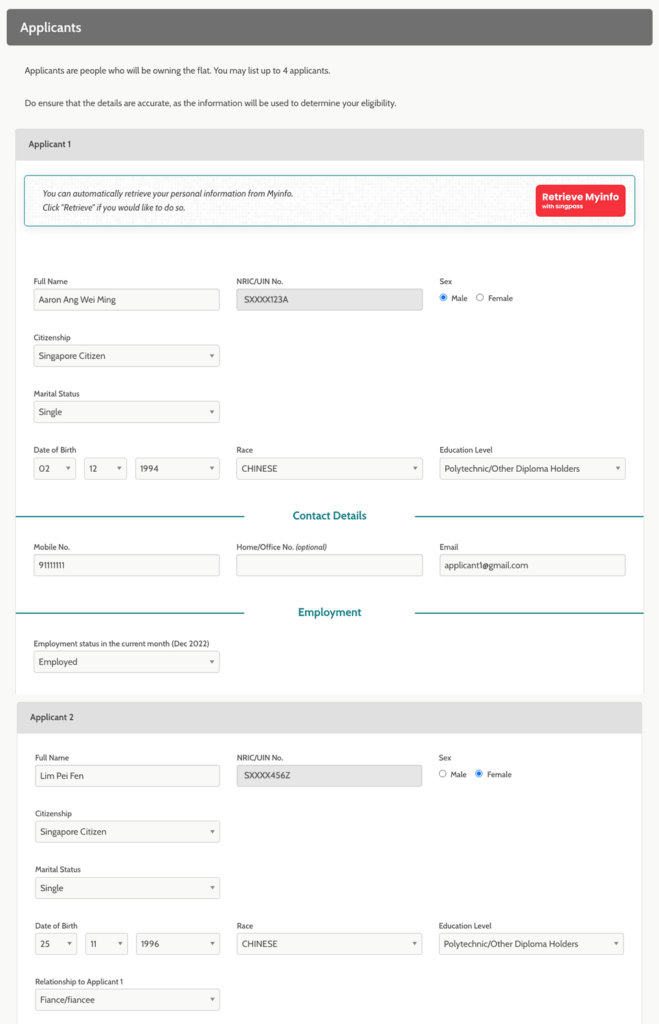
Next, provide the employment details, monthly income and bonuses received for all persons listed in the application.
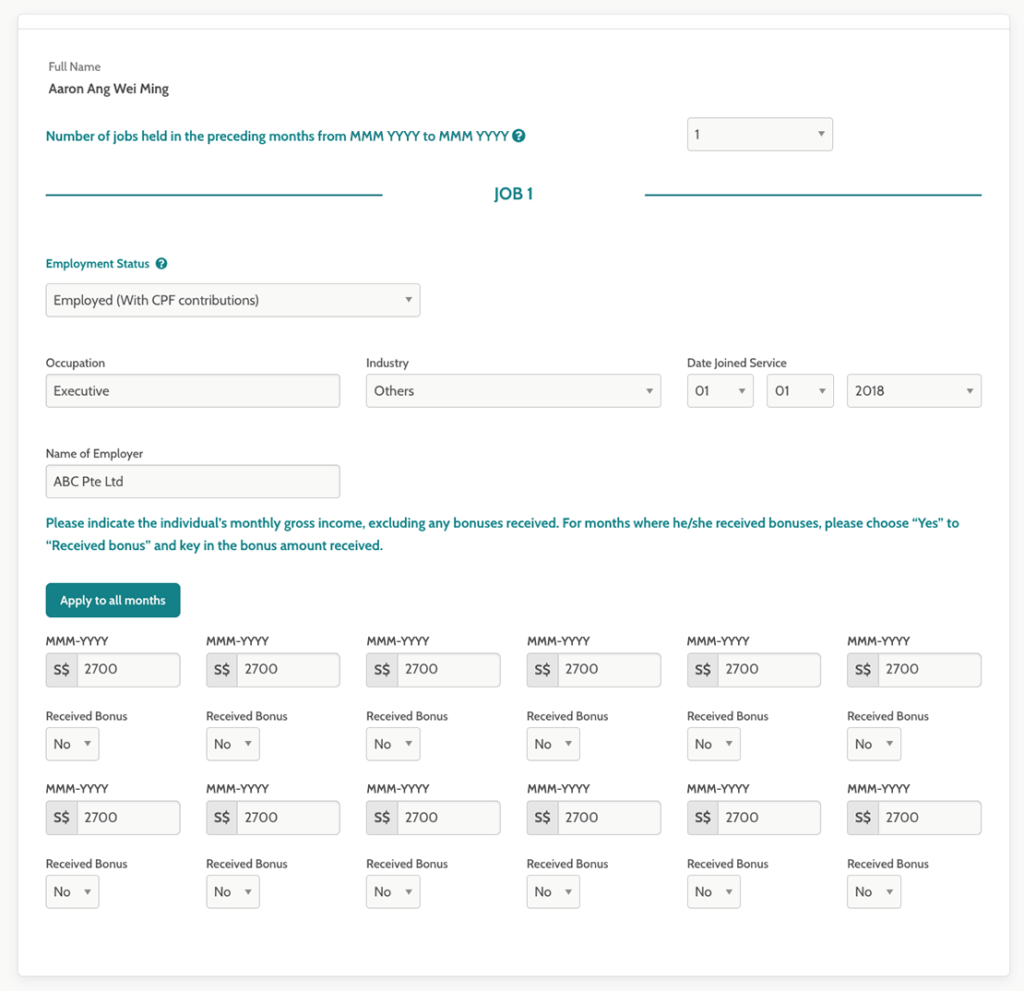
Submit declarations
You will then need to declare any interest in private properties for all persons listed in the application.
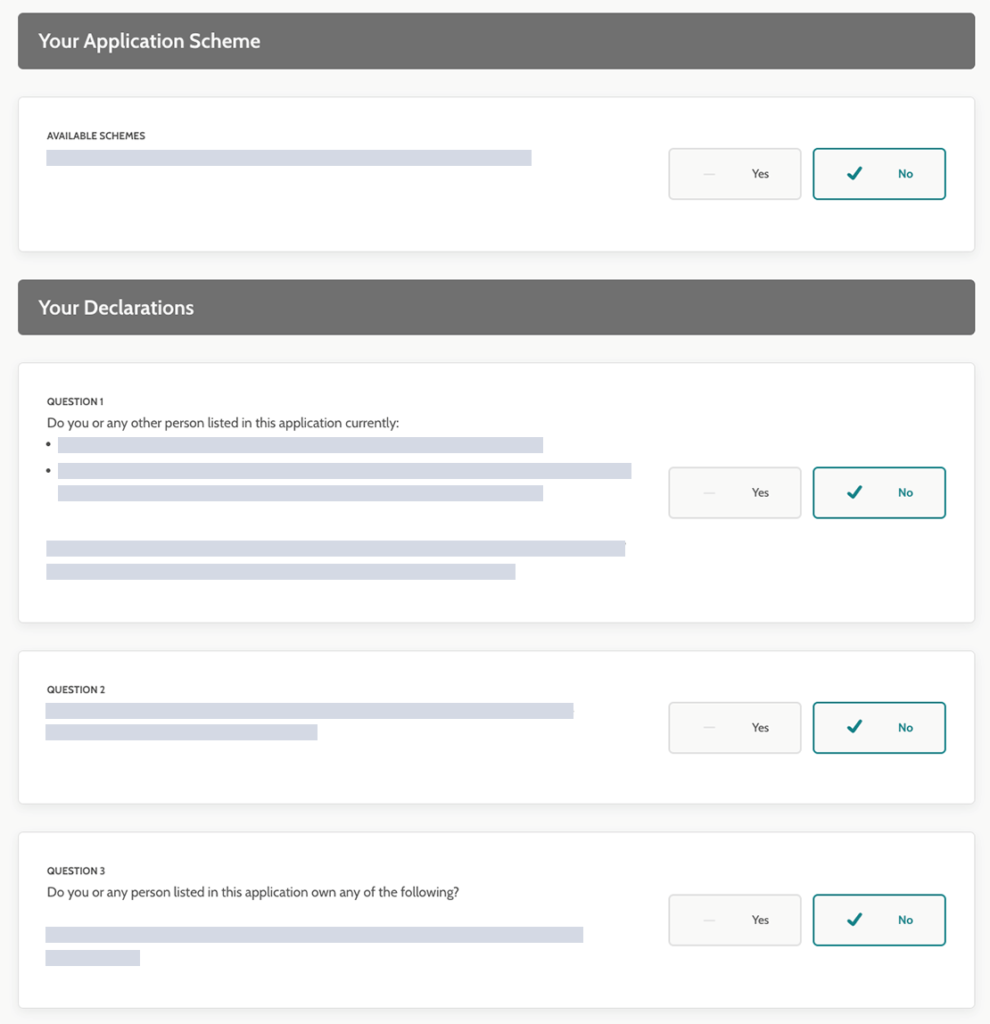
State housing loan intent(HDB or Bank Loan)
Indicate whether you intend to take up a housing loan for the flat purchase. If you do, you will also need to declare any monthly financial commitments, such as instalment plans, bills, insurance premiums, and other loan payments.
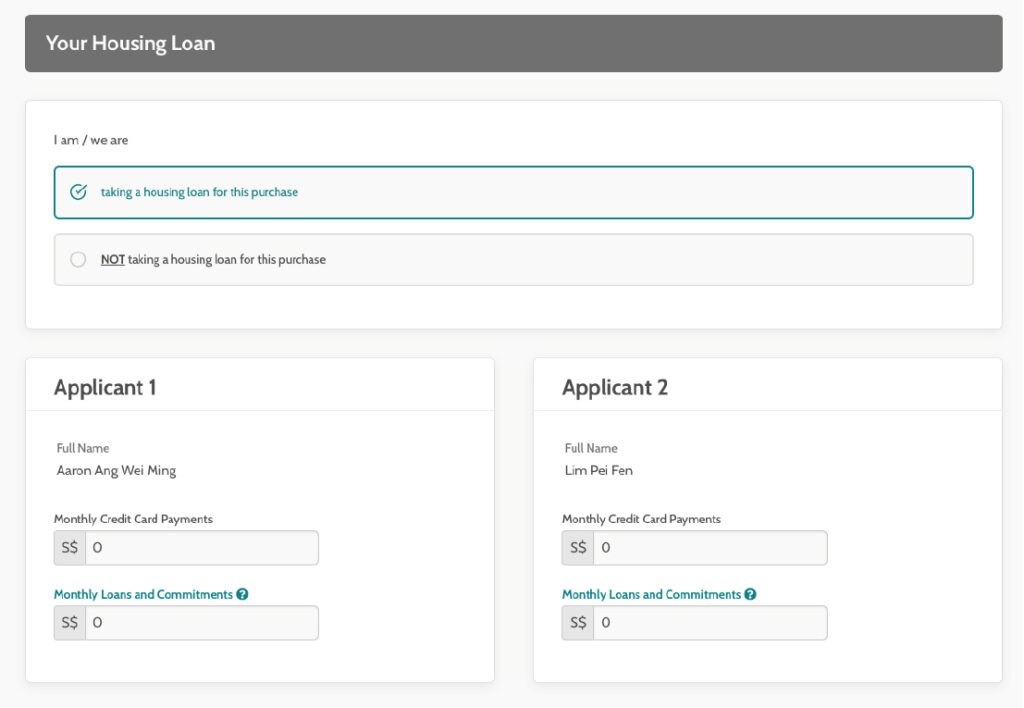
Review details and receive preliminary HFE assessment
Finally, review the information you have provided. Pro-tip: If you want to make any changes after this, you will need to start the preliminary HFE check afresh, so ensure the information is accurate.
You will then receive a preliminary assessment of your eligibility to buy a new and resale flat, receive CPF housing grants, and take up an HDB housing loan. You can log back into the HDB Flat Portal to view your preliminary HFE assessment anytime within the next 30 days.
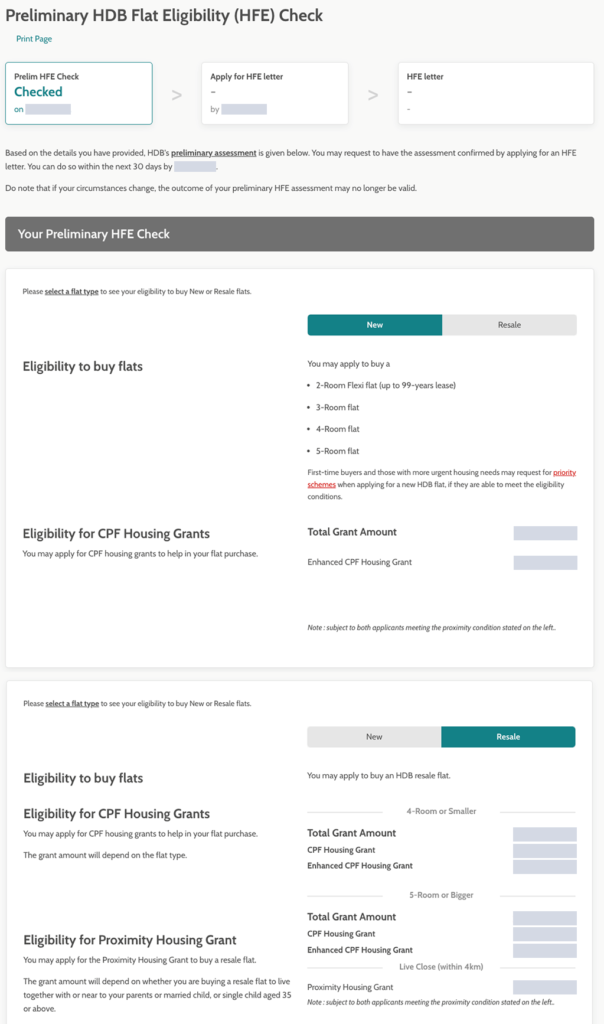
 If you are eligible for an HDB housing loan, you can also compare different loan scenarios, including the monthly instalments and interest payable, based on different loan amounts and repayment periods.
If you are eligible for an HDB housing loan, you can also compare different loan scenarios, including the monthly instalments and interest payable, based on different loan amounts and repayment periods.
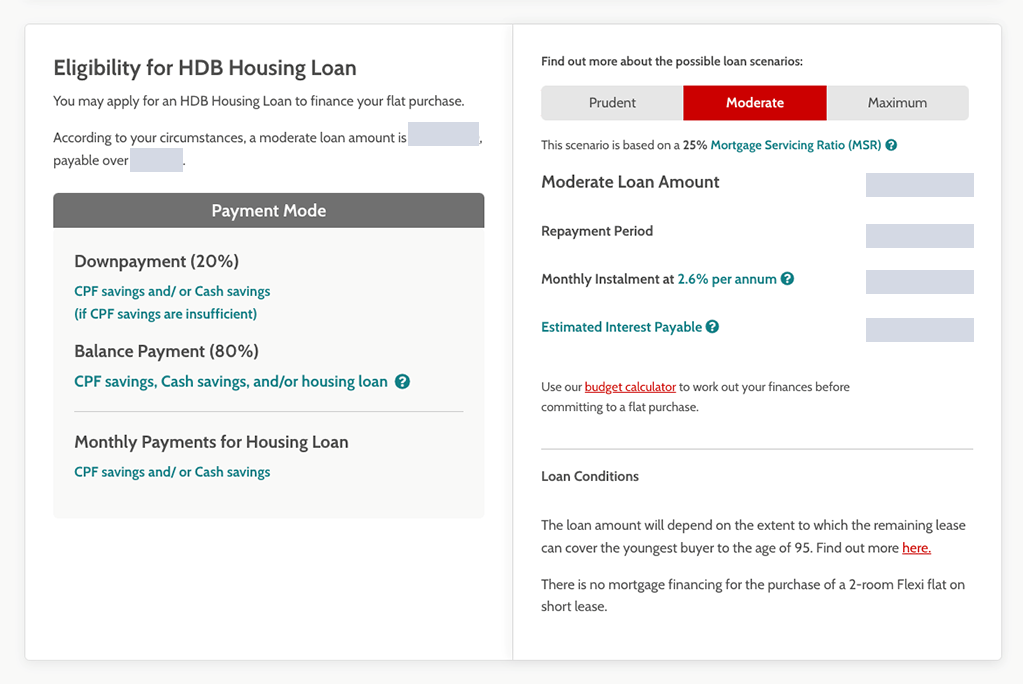
If there are any changes to the information provided (such as your employment, income, or ownership of private properties), you must start your preliminary HFE check afresh.
If you have decided to buy an HDB flat, you will need to proceed to Step 2, which is to apply for an HFE letter. This must be done within 30 calendar days from starting your preliminary HFE check.
Step 2: Apply for an HFE Letter : How to apply HDB HFE Steps (9 May 2023)
Choose loan options
Start your application by logging in to the HDB Flat Portal using your Singpass.
You will first need to confirm whether you intend to take up a housing loan to buy a flat. The option you previously indicated in your preliminary HFE check will be displayed. If you change your mind, you may select a different option.

If you wish to take up a housing loan to finance your flat purchase, you can:
- View your eligibility for an HDB housing loan and the different loan scenarios
- Find out more about the considerations in taking up a housing loan from financial institutions (FIs)
 As with the preliminary HFE check, you can save a draft if you need more time to complete the application. Your draft will be available for 30 calendar days from the date you start the preliminary HFE check.
As with the preliminary HFE check, you can save a draft if you need more time to complete the application. Your draft will be available for 30 calendar days from the date you start the preliminary HFE check.
Did you know that you will also be able to compare housing loan packages from HDB and the participating FIs, and request an In-Principle Approval (IPA) for a housing loan from the FIs? The IPA will provide you with the FI’s indicative loan assessment.
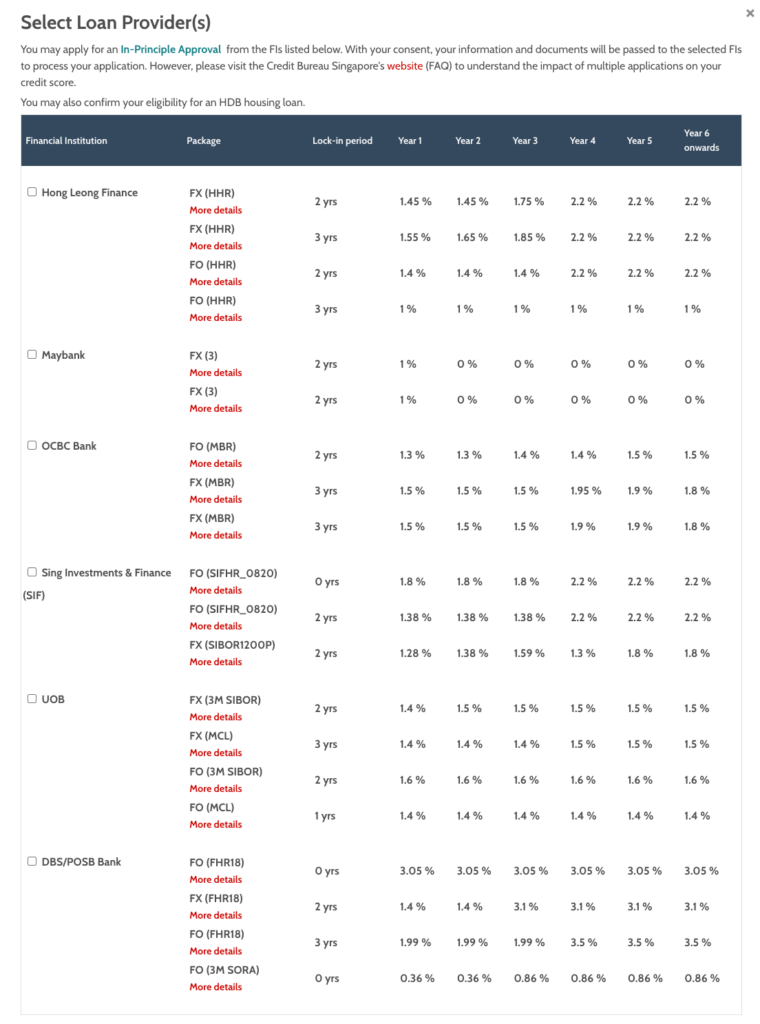
Provide additional details
Next, provide your particulars. To speed things up, you can use Myinfo to retrieve your:
- Particulars and contact details
- CPF contribution history over the past 15 months
- Latest Notice of Assessment from IRAS
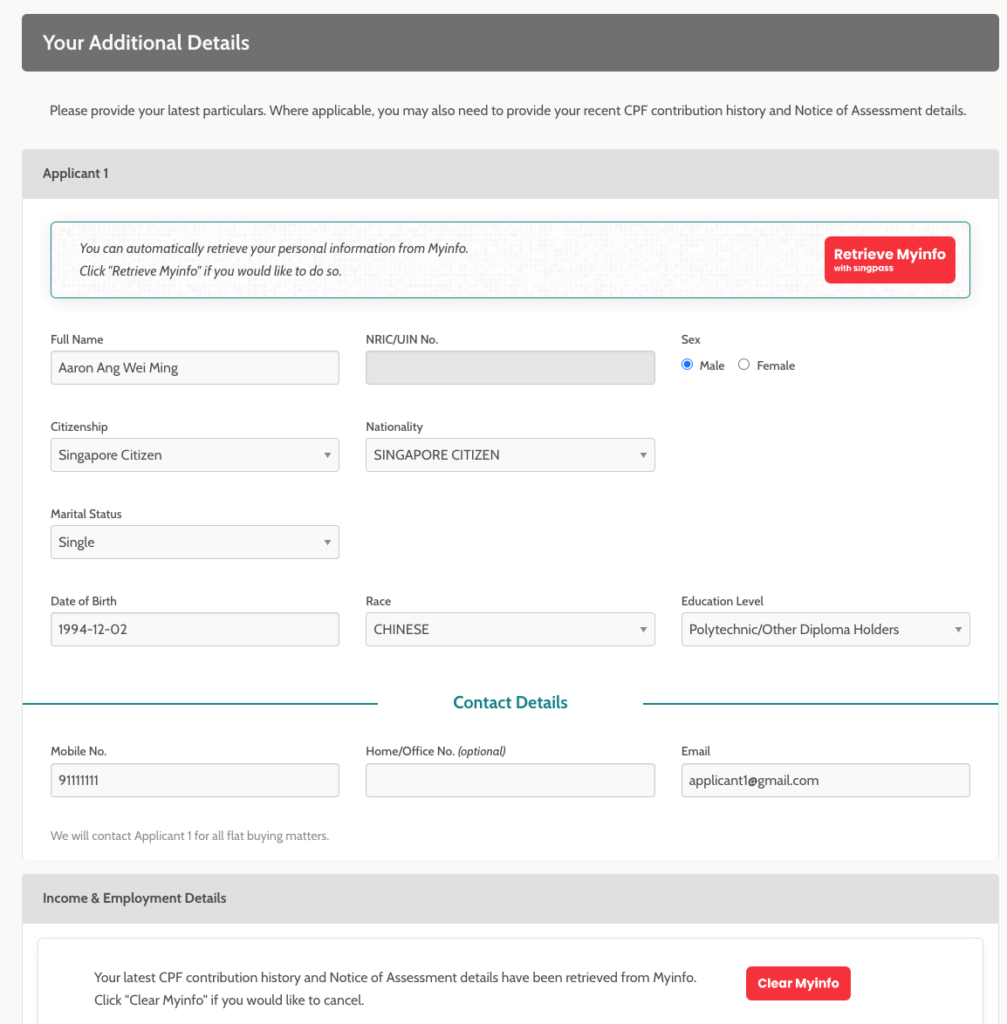
Review details
Before submitting your application, review your particulars, income details, and information regarding your household’s ownership of private property declared during your preliminary HFE check. If there are any changes, you must start your preliminary HFE check afresh.
Next, review your chosen financing option and loan provider(s), if you are taking a housing loan. If you need to make any changes, only Applicant 1 can do so by returning to “Choose loan options”.
Finally, please go through the terms and conditions of the application.
Once you are ready, digitally endorse all the information provided. To submit the application, all applicants and occupiers, if any, must log in using Singpass to verify their details and declarations.
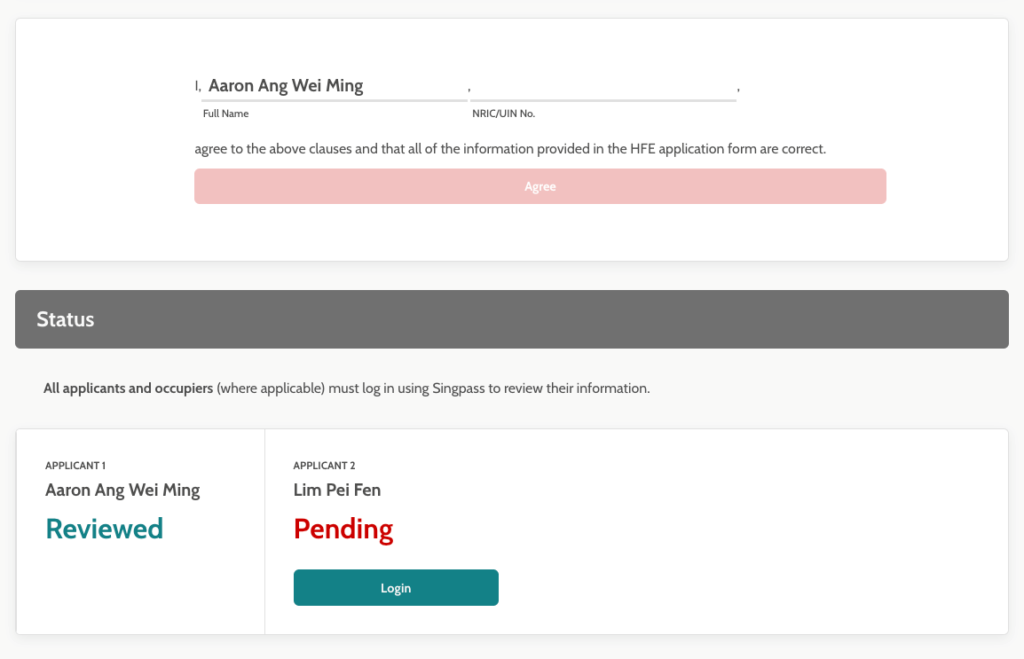
Upload documents
Once all applicants and occupiers have endorsed the application, you will be advised on any supporting documents required.
Submit application
After you have uploaded the required documents and submitted your application, you will see an acknowledgment page. HDB will contact you if any additional information is required for your application. To check the status of your application, you can log in to the HDB Flat Portal at any time.
Typically, HDB will send you the HFE letter within 21 working days of receiving your complete application though the processing time may be longer during peak periods, such as in the months of and before a sales launch.
If you applied for an IPA from the participating FIs, they will liaise with you directly on the outcome of your IPA application. You will be able to confirm the FI’s loan offer through the HDB Flat Portal after securing a flat.
Receive HFE letter
When your HFE letter is ready, you will be notified via SMS to log in to the HDB Flat Portal.
The HFE letter is valid for 6 months.
Registration of HDB Intent to Sell have moved to My Flat Dashboard. Following is the link. https://services2.hdb.gov.sg/web/bp28/TimeLine/my-flat-dashboard
RE: With effect from 9th May 2023, HDB will replace
Home Loan Eligibility(HLE) with HDB Flat
Eligibility(HFE).
HFE streamlines eligibility checks for:
1. Flat Purchase (New or Resale)
2. CPF Housing Grants
3. HDB Housing Loans (Former HLE)
The HFE letter, which will replace the current HDB Loan Eligibility (HLE) letter, will inform flat buyers upfront of their eligibility for a new or resale flat purchase, CPF housing grants, and HDB housing
loan, including the respective grant and loan amounts.
Click here to apply, HDB InfoWEB or through scanning the QR code below.
[1] Second-timers will also be advised on the resale levy/premium payable for the purchase of a second subsidised flat from HDB, if they are eligible for one.
[2] The information provided by the applicants in step 1 will be populated for their confirmation. If there are any changes to the information provided, the applicants may have to start step 1 afresh.
[3] The processing time of an HFE letter application is up to 21 working days. It is expected to be longer during peak periods, such as in the months of and before a sales launch. Flat buyers are advised to apply for an HFE letter early.
[4] The six participating FIs are: DBS Bank Limited, Hong Leong Finance Limited, Maybank Singapore Limited, Overseas-Chinese Banking Corporation Limited, Sing Investments & Finance Limited, and United Overseas Bank Limited.
[5] The FIs will liaise with the flat buyers directly on the outcome of their IPA and LO applications. (You may also contact your Real Estate Salesperson to compare and choose the competitive interest rates)
How your HDB HFE Letter will look.
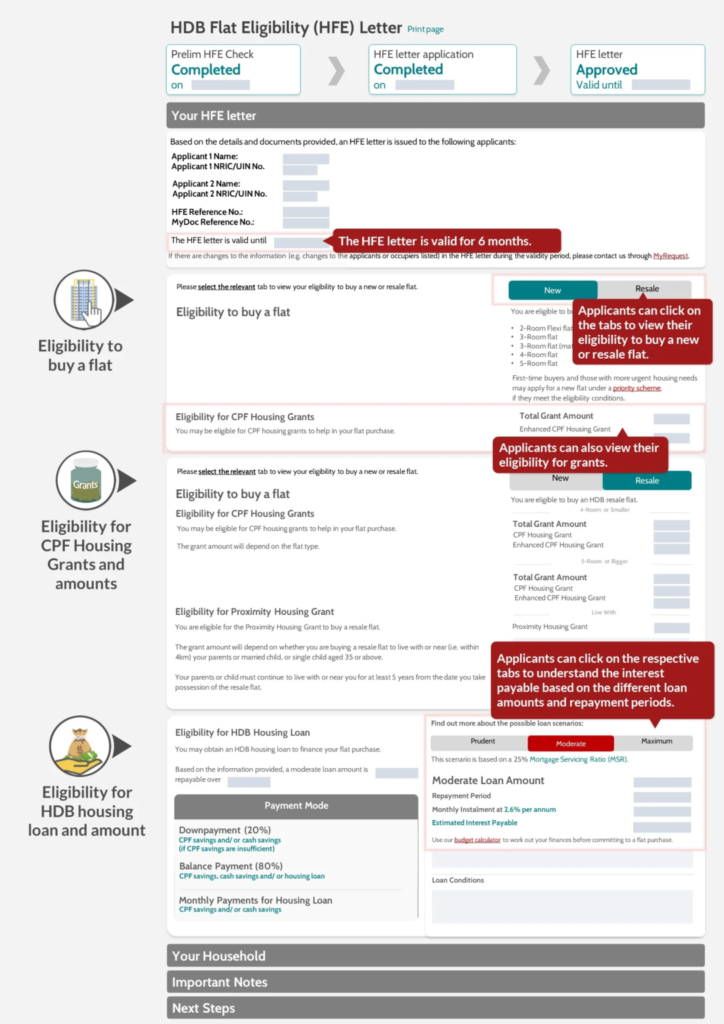
HDB Grants that remain Unchanged from 9th May 2023.
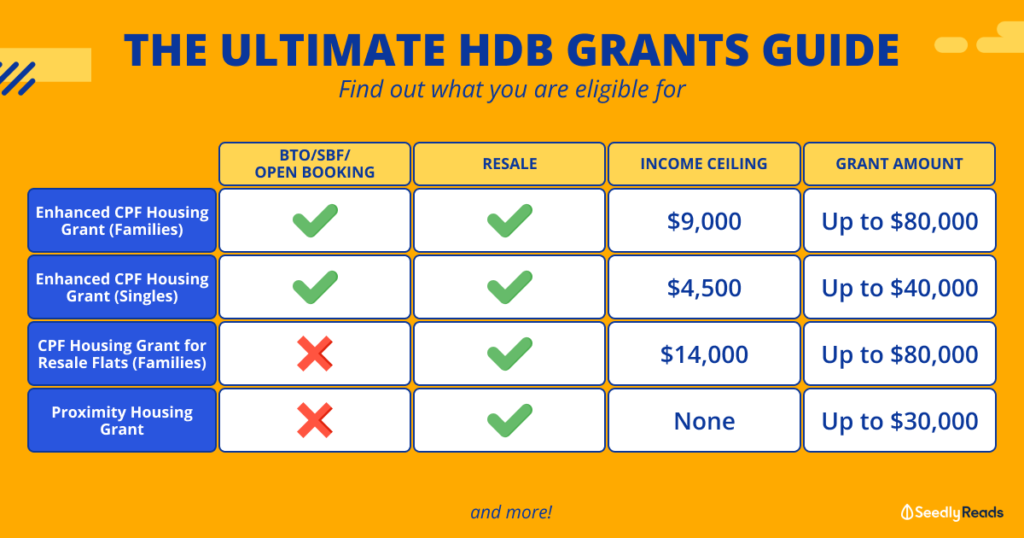
MOP HDB Sold by Us Recently:
Source: HDB
Source : https://www.mynicehome.gov.sg/hdb-how-to/buy-your-flat/a-guide-to-applying-for-an-hdb-flat-eligibility-hfe-letter/
The post How to apply HDB HFE Steps (9 May 2023) appeared first on Wing Tai Holdings Singapore.
]]>The post Efficient Timeline When Buying Resale HDB Flat in Singapore (Update 2023) appeared first on Wing Tai Holdings Singapore.
]]>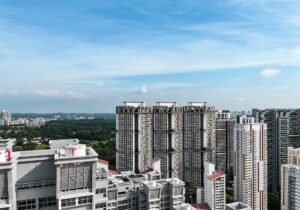
Are you having headaches due to complex procedures when buying a resale HDB apartment? Don’t worry, we got your back! This blog will help you effortlessly grasp the WHOLE purchase process! How much time should you allot in the purchasing step? What does the entire process look like, and what are the key notes to keep in mind? What are some of the costs to pay along the way? Read this to prepare yourself as a smart buyer!
- Week 1: Issue Option to Purchase (OTP)
- Week 4: Exercise OTP
- Week 8: Submit Resale Application
- Week 10: Resale Application Accepted
- Week 12 To 13: Flat Examination And Document Checking
- Week 14 to 15: Resale Approval
- Week 18 to 20: Resale Completion
- Summary Map of HDB Resale Process and Timeline
According to the HDB (Housing & Development Board) organization, the buying process will usually take from 4 to 4.5 months (16 to 20 weeks).
[BUY RESALE HDB] WEEK 1: ISSUE OPTION TO PURCHASE (OTP)
After the OTP is granted, purchasers are asked to make a valuation request via their HDB Resale Portal for the apartment they buy by the next working day (unless you are using FULL CASH for purchase).
A HLE letter from HDB or letter of offer from banks is required based on your mortgage loan preference.
Before you proceed to activate the OTP, all required documentation must be available within 21 days after the OTP issue date. It will take 5-7 days to validate your OTP request.
Note: No action is needed from the seller at this step while waiting for the buyer to use the OTP.
[BUY RESALE HDB] WEEK 4: EXERCISE OTP
You can exercise the OTP at any time within the next 21 days from OTP expiry.
WEEK 8: SUBMIT RESALE APPLICATION
Within 30 days from the OTP exercise date, both Sellers and Buyers must submit their respective resale applications via the HDB Resale Portal. It is necessary to communicate and decide the time to submit with the other side.
Note: Any buyer or seller may submit their paper first, but the rest must do so within seven days from the submission of the first party.
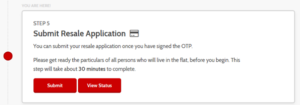
WEEK 10: RESALE APPLICATION ACCEPTED
After the resale application is approved, sellers and buyers will get a notification through SMS, in which they will be notified of the expected completion date.
Note: Resale application acceptance might take up to 3-10 working days, considering the amount of applications received.
Once approved, HDB begins executing the transaction by verifying the eligibility of the purchasers and sellers, along with processing any necessary documentation.
WEEK 12 TO 13: FLAT EXAMINATION AND DOCUMENT CHECKING
This action should be done at least 1-3 days before resale completion. An SMS will be sent to buyers and sellers asking them to sign the paperwork. Various resale papers, such as computations, forms, and commitments, will be handed and will need the individual endorsements of each party.
For example, if there are two owners of the apartment, both Sellers A and B must each log in using their own singpass to endorse the paperwork.
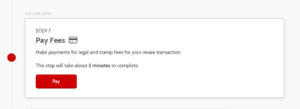
Administrative costs, including caveat and conveyancing fees, must be paid online through the HDB Resale Portal or HDB Hub within three days with the written advice if you have no means to make online payment.
WEEK 14 TO 15: RESALE APPROVAL
An SMS will be delivered, which will notify buyers and sellers that the application has been accepted. Both can find the approval letter in the HDB Resale Portal.
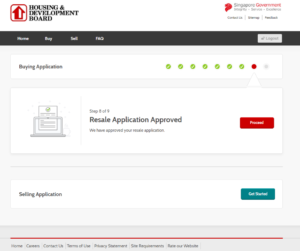
WEEK 18 TO 20: RESALE COMPLETION
Resale apartment process typically takes 8 to 10 weeks to be completed after the Acceptance of the Resale Application. Sellers are required to make sure that all giro payments for the apartment have been stopped, the property tax has been paid until the end of the year, and the S&CC has been paid until the completion date.
To receive a receipt from Town Councils, payment for S&CC must be done in person at their offices. During the end ò this step, the receipt for S&CC paid and evidence of payment with no outstanding property tax amount are required.
SUMMARY MAP OF HDB RESALE PROCESS AND TIMELINE
By having a deeper knowledge of the HDB resale procedure and schedule, you can better manage time and resources for transition.
The below image has summarized the full HDB resale procedure and schedule to make it simpler for our readers to understand.
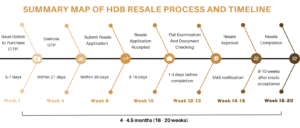
Still vague or need more information? Please don’t hesitate to get in touch with us through email, phone or website if you need any help in finding, arranging and moving to your future home. As a large-scale professional agency who has acquired 10 years of experience and satisfied 170 customers, we guarantee to best assist you with the most affordable cost and fast-to-proceed reliable information!
The post Efficient Timeline When Buying Resale HDB Flat in Singapore (Update 2023) appeared first on Wing Tai Holdings Singapore.
]]>The post 6 Heartfelt Rules Every Property Agent Should Remember When Handling HDB Flat Rentals appeared first on Wing Tai Holdings Singapore.
]]>With a unique set of rules and regulations specific to HDB flats in Singapore, it’s crucial to approach these transactions with the right knowledge and expertise.
Here are six important things that real estate salespersons (RESs) must be mindful of when representing HDB flat owners looking to rent out their flats.
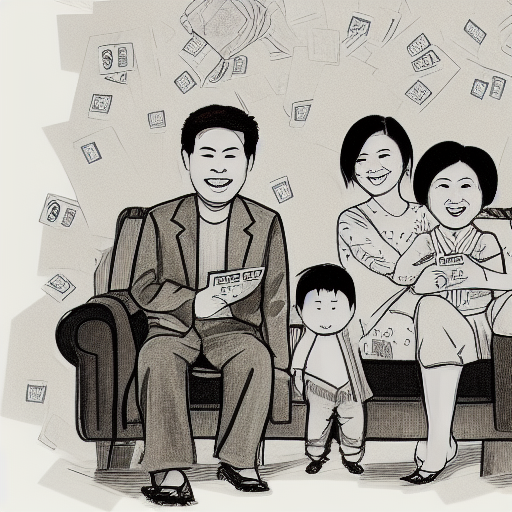
1. Be familiar with and explain to flat owners the policies/guidelines on renting out their HDB flat
CEA would like to remind all RESs that the Code of Ethics and Professional Client Care (CEPCC) requires you to protect and promote your clients’ interests.
RESs must be fully conversant and comply with the relevant laws, regulations and codes that apply to property transactions, including HDB’s guidelines.
It would help if you also took time to explain these guidelines to your clients.
The complete set of guidelines for renting out flats can be found on the HDB InfoWEB.
Here are some key ones:
- Only Singapore Citizen households who have fulfilled the minimum occupation period (MOP) can rent out their whole flats.
- Homes where all the flat owners are Singapore Permanent Residents (SPRs), are not allowed to do so.
- The MOP ensures that flat owners purchase HDB flats with the intent of living in the flat themselves, instead of quickly reselling the flats for profit or renting them out for rental income.
- It deters speculative purchases of HDB flats and helps to keep these flats affordable for those with genuine housing needs.
- Flat owners should also take note of the maximum number of tenants allowed in each flat:
- 1-room and 2-room flats: 4 tenants
- 3-room and bigger flat types: 6 tenants
- Flat owners must consider the non-citizen (NC) quota if any tenants renting the flat are of a foreign nationality holding a valid work/immigrant pass.
- The NC quota is to prevent the formation of foreign enclaves in HDB estates and maintain the Singaporean character of our HDB heartlands while balancing the housing needs of citizens and foreigners in Singapore.
- Malaysians are not subject to this quota, given their close cultural and historical similarities with Singaporeans.
- If the quota is reached, only Singaporeans and Malaysians can rent a flat in that neighbourhood/block.
- Flat owners may use HDB’s e-Service to check the NC quota for the flat.
- Do note that the NC quota enquiry results only apply for renting out applications submitted within the same month.
2. Advise flat owners to check their eligibility to rent out their HDB flat
To check their eligibility to rent out the whole flat, flat owners may log in to My HDBPage with their SingPass, and go to “My Flat > Purchased Flat > Renting Out of Flat”.
Do guide your client to perform this critical step before facilitating the transaction.
As part of your due diligence checks, you should also request a screenshot of the notification from HDB to your client for your retention.
3. Do not facilitate the rental transaction if the criteria (e.g. meeting the MOP requirement) to rent out whole flat have not been met
There have been cases of RESs breaching HDB’s regulations when they facilitated the renting out of whole HDB flats, often under the guise of room rentals – despite being aware that the flat owners had yet to fulfil the MOP or were SPRs and were ineligible to rent out the whole flat.
Errant RESs may be warned, issued a financial penalty, and their registration with CEA suspended or revoked.
Under the CEPCC, RESs must not do anything which may directly or indirectly lead your clients to infringe on any property-related laws and regulations, including HDB’s guidelines.
In renting out HDB flats, your clients must meet HDB’s eligibility requirements to rent out their flats, including fulfilling the MOP.
As professionals, RESs should refrain from working with clients to circumvent existing rules.
If you encounter clients who ask you to facilitate the rental of a whole flat when they are ineligible, e.g. if they have yet to fulfil the MOP requirement, do reject such requests and advise your clients on the right thing to do.
This would protect not only your own interests but also that of your client and the prospective tenants.
It will also signal to consumers that RESs conduct their work with integrity and high ethical standards.
This will contribute to further uplifting the standing and reputation of the RES profession.
In June 2022, CEA took disciplinary action against RES Ivy Kim Peisi, who had represented the landlord in the rental of the whole HDB flat, which was still within MOP.
Despite knowing that the flat was still within the MOP and that the landlord had not obtained approval from HDB to lease out the whole flat, Ivy proceeded to advertise to rent out the entire flat and facilitate the transaction.
When the tenant and his wife attended the viewing, Ivy showed them around the flat, including the living hall, kitchen all three bedrooms. She also informed them they could use the entire flat if they rented it.
After the landlord agreed to rent the flat to the tenants, Ivy prepared a room rental agreement for two rooms instead of a whole flat agreement.
The agreement also stated that more than two persons should not occupy the flat.
When the tenant’s wife expressed concerns about the agreement, Ivy assured the tenant’s wife that her entire family could use the whole flat, including all the rooms, and that the tenant could ignore the agreement’s wording as it was just a formality.
When HDB found out about the unauthorised flat rental after an inspection, Ivy assisted the landlord in helping to cover up the matter.
Text messages between Ivy and the landlord showed that she had encouraged her client to rent the flat in a manner that she thought would allow him to circumvent the legal requirements.
The flat was subsequently compulsorily acquired by HDB because the landlord had rented out the whole unit without HDB’s prior written consent.
Ivy’s actions caused inconvenience and expense to the tenants, who had to move out only after moving into the flat for about a month and a half.
Further, had Ivy been more principled in her dealings with the landlord and not assisted him in renting out the entire flat, the landlord’s flat might not have been compulsorily acquired by HDB.
CEA’s Disciplinary Committee imposed a $5,000 financial penalty and a 4-month suspension on Ivy.
She was also required to pay fixed costs of $2,000 in favour of CEA.
4. Advise flat owners to check that their foreign tenants (Malaysian citizens excluded) are legally residing in Singapore
You should advise your client to check that their non-citizen tenants hold valid work/immigrant passes with a validity of at least six months at the point of renting out an application to HDB.
These checks can be done online:
5. Ensure that flat owners obtain HDB’s approval to rent out their flat
Do remind your clients that they must obtain HDB’s approval before renting their flat.
They can submit their application through one of these channels:
6. Explain the clauses in the tenancy agreement to flat owners
The Tenancy Agreement covers the terms and conditions of renting a property, containing clauses relating to the main aspects of the tenancy to protect and balance the interests of both landlords and tenants.
Do ensure that your client understands them before signing the agreement.
We remind all RESs to act professionally and ethically by implementing the above pointers when facilitating an HDB flat rental transaction.
Reference : CEA website as at 21 Oct 2022
The post 6 Heartfelt Rules Every Property Agent Should Remember When Handling HDB Flat Rentals appeared first on Wing Tai Holdings Singapore.
]]>The post Timeline of upgrading from HDB to Private Condo in Singapore appeared first on Wing Tai Holdings Singapore.
]]>Here are several option property owners should consider before making a decision
Option 1 : Own both HDB Flat and Private Condominium
Choosing to keep both HDB and the newly purchased Private Condo. Property owners have the choice between renting out the HDB or the new condo. Several Pros and Cons to this option are this options allows you to generate rental income. However, you will have to pay for 20% Additional Buyers Stamping Fee (ABSD). In addition, a higher expense is required to purchase the new condominium as you can only take 45% loan for the private condo if you still have an outstanding HDB loan. Finally, HDB flat value is likely to depreciate over the years.
What is ABSD?
‘Additional Buyers Stamping Fee’ is a fee required to be paid on top of the Buyer’s Stamp Duty (BSD). Several criteria will determine if you will have to pay ABSD, one of which is a Singapore citizen that has more than one residential property. The rate for a second residential property owner is 20%.
Timeline for buying a private condo
If you have fulfilled your five years Minimum Occupation Period (MOP), you are allowed to keep your HDB flat and buy a condo. You can choose to continue staying in your HDB flat or move into your new condo. Maybe you are thinking, why not keep your HDB and rent it out since the rental yield is very attractive? Then with the rental income, you can use it to finance your new purchase. Sounds very logical?
But do take a step back and consider the disadvantages. Firstly, since the new purchase will be your second property (HDB doesn’t allow part-sale or is commonly known as ‘decoupling’), you would need to pay an Additional Buyer Stamp Duty (ABSD) of 20%. Yes, no kidding! 20% is a lot of money. Many people loathe the thought of throwing away this considerable sum of money. If you were to buy a $1.2 million condo, a 20% ABSD amounts to $240,000. Suppose you rent out your flat at $3,500 a month or $30,000 a year, the $240,000 ABSD will set you back by 5.7 years in rent. Oh no! It’s like going through another round of M.O.P.!
Secondly, your HDB flat may likely depreciate over time. (Although HDB has been proven resilient, HDB owners usually enjoy the luxury of spaciousness and capital appreciation over time.
Just for illustration if some feel that HDB will still depreciate over time.
Suppose your HDB flat is worth about $600,000 now, and it depreciates at 2% a year, in 5.8 years you would have lost about $68,400. So, does it make economic sense to earn $42,000 of annual rental income from your HDB flat, while losing almost $240,000 in terms of ABSD and depreciation? You would also need to fully clear your HDB loan to enjoy the maximum 75% loan for your condo purchase. Otherwise, you can only borrow 45%.
So, does it make economic sense to earn $42,000 of annual rental income from your HDB flat, while losing almost $240,000 in terms of ABSD and depreciation?
Hence, to buy a $1.2 million condo without selling your HDB flat, you would need at least 25% (5% down + 20% ABSD) in cash, which is $300,000, together with the Buyer Stamp Duty (BSD) $32,600 , you would total need to have $320,600 of cash/cpf. This upfront capital outlay may make it look like it is out of reach for many people. However you maybe surprised that there are a good bandwidth of Singaporeans sitting on a large amount of Cash and CPF!
Option 2: Wing Tai Holdings First Then Sell HDB
When buying your first condo you could carefully choose the right property. Once you made a choice, make sure you have the time to renovate and move into the new house.
But there is a catch! You will have to pay ABSD first and then claim back if new purchase is a matrimonial home (i.e. buy under husband and wife’s names) and sell off the HDB flat within six months. This upfront financial commitment may present some cash flow problems for some people. If you still have an outstanding HDB loan, the maximum amount you can borrow is 45%, so you would need more capital outlay to buy a condo.
If you choose to buy a condo first then sell your HDB, you will face some issues with ABSD and loan. Similarly, the initial capital outlay is very high. However, though you have to pay the ABSD first, if you are able to sell your HDB flat within six months, you can apply for remission and get back your money. This remission only applies to the matrimonial home; the property must be in both husband and wife’s names. There is no remission for singles, widows/widowers, and divorcees. Overall this option gives you a pressureless way to shop for your new condo.
Buy a condo first before you sell your HDB will incur ABSD
Option 3: Sell HDB First Then Wing Tai Holdings
What is good about is option is that there is no ABSD. You can slowly take your time to find your dream home. There won’t be any cash flow problem like option 2. Your HDB can be sold at a higher price now than letting it depreciate to a lower price at a later time. However, you might need to find temporary accommodation meanwhile looking for a new condo after selling off your HDB. Temporary accommodation means extra expenses during the interim period.
Some do not like the idea of having to move twice and having to rent for say, two to three years before the new place is ready. On the positive side, the value of your flat may likely depreciate over the two to three years while you are renting. So you are selling at a higher price NOW. This should offset the cost of renting. It would be wise to book a new condo during launch to enjoy early bird discounts and first mover advantage. So, selling your flat first will free you from the time to buy a new condo.
Option 4: Sell Your HDB Flat And Buy A Condo At The Same Time
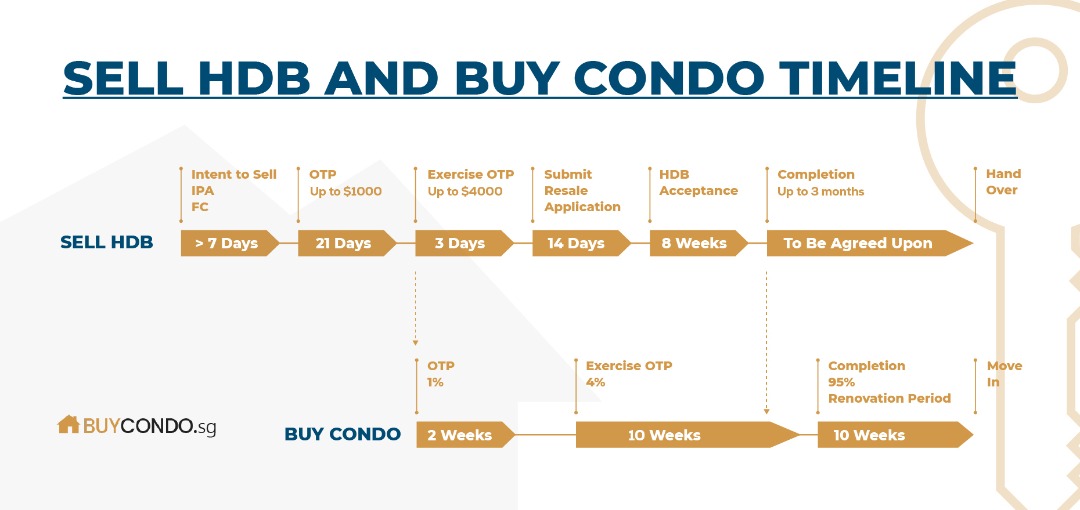
Another option is to sell your HDB and buy a condo at around the same time. By doing this, you still have have the time to find the ideal house you are looking for cause selling off the HDB takes time (around 8 -10 weeks). Meanwhile, you can search for your next dream home while selling off your HDB. The best if you could match up the OTP at around the same time so you could move out and move in to the new condo immediately. By doing that, you could save some cash from hiring movers or renting a temporary accommodation plus no ABSD if it is planned well.
The only downside is that you will need sufficient cash to pay the 5% cash and buyer stamp duty. Some experience is needed to plan properly from selling HDB and buying your condo. And also, some buyers may not be willing to grant you the extension of stay when selling off your HDB.
All of the options need experience and knowledge. If you are still confused, feel free to contact us at buycondo.sg and we will gladly assist you in whatever way possible to ease your selling or buying of any condo here in Singapore!
The post Timeline of upgrading from HDB to Private Condo in Singapore appeared first on Wing Tai Holdings Singapore.
]]>